#Los Angeles Travel Magazine
Photo
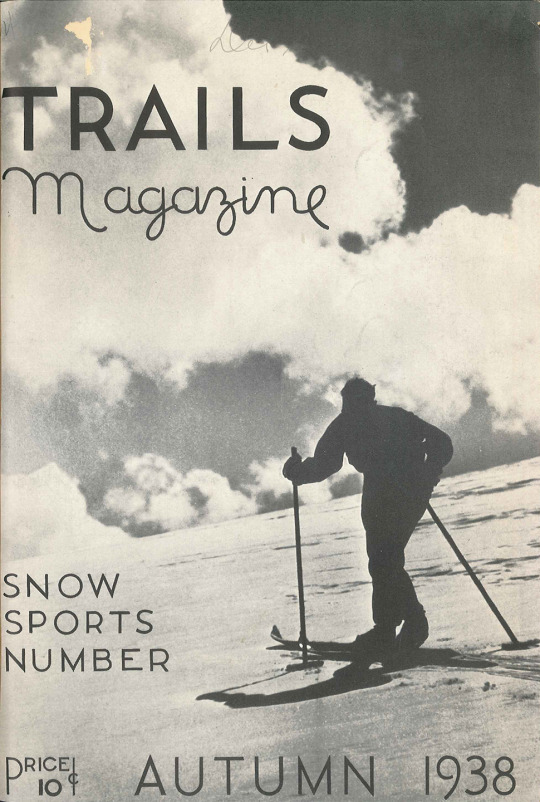
Trails Magazine was published quarterly from 1934 to 1939/1941 by The Mountain League of Southern California. It covered the history of, as well as the skiing, climbing and hiking activity in, the mountains that are in proximity of Los Angeles and Southern California including the San Gabriel, the Sierra Nevada and the San Jacinto ranges.
Funding, which had come from the Los Angeles Department of Recreation, was cut off after the Spring 1939 issue.
It had a brief two-issue resurgence in 1941, being published by the Southern California Outdoor Federation, but “due to War conditions it seemed advisable to discontinue publication.”
Here is an archive of issues.
This Autumn 1938 issue includes California climbing pioneer Glen Dawson writing about early ski mountaineering in the Sierra Nevada, California.
#los angeles#california#mountains#skiing#climbing#vintage#history#magazine#1930s#travel#outdoors#publication
46 notes
·
View notes
Text
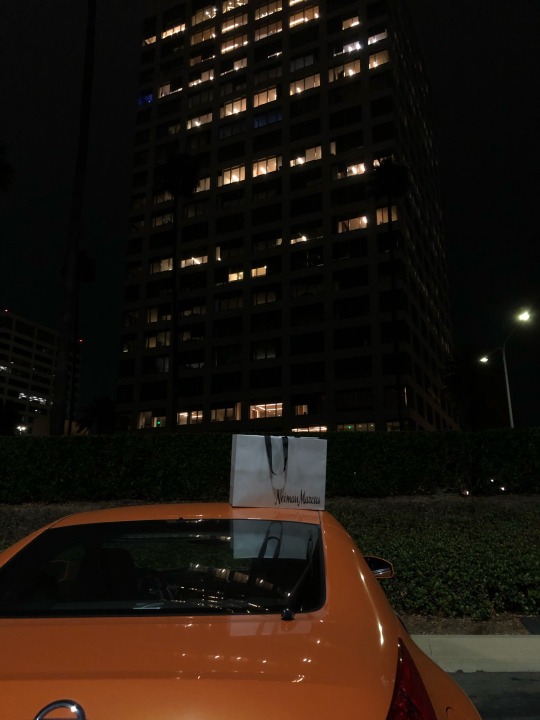
stay down til you come up.
#chill aesthetic#good vibes#luxury#luxurylifestyle#trap#aesthetic#playboi carti#playboy magazine#travel#lifestyle#los angeles#new your city#fashion#vaporwawe#quotes#life quotes#moodboard#money#balenciaga#stone island#neiman marcus#foreign#film#miami vice#streetwear#vintage#raf simons#traveling#explore
16 notes
·
View notes
Text
The Rising Action
Kenji Sato x Journalist! Reader
Enemies To Lovers | Foced Proximity | Pining
<- prev next ->



“Hit me like a poisonous dart. You were trouble right from the start. Should’ve ran I guess that’s my fault”. - I do by G-IDLE
⁺˚•̩̩͙✩•̩̩͙˚⁺‧͙⁺˚•̩̩͙✩•̩̩͙˚⁺‧͙⁺˚•̩̩͙✩•̩̩͙˚⁺‧͙⁺˚•̩̩͙✩•̩̩͙˚⁺‧͙⁺˚•̩̩͙✩•̩̩͙˚⁺‧͙⁺˚•̩̩͙✩•̩̩͙˚⁺‧͙⁺˚•̩̩͙✩•̩̩͙˚⁺‧͙⁺
“Ken Sato has received a 3rd strike. One wonders, how hard is it to hit a small ball, I bet a one-eyed zombie could hit a ball better than he can”. You say into your recorder.
“Wow, you are harsh”. Ami says as you end your recording.
“It’s called being honest. I report what I see”. You reminded her. “I mean have you seen the way he played today”?
“Yes Y/N, we’ve been watching the same game. But it got me thinking. When I interviewed Ken, he refused to talk about his family. He refuses to show vulnerability. It’s like he’s wearing some sort of mask. Something is going on with him, and when I know something, I don’t let go”. Said Ami.
“Wow, you are very determined”.
“At least get to know him before you start roasting him”. Ami suggested.
“Note taken”. You lied.
After graduating college, you were hired as an intern at the Los Angeles Magazine. You would stay at the office after midnight to revise and edit articles for other reporters. Eventually, your boss gave you your first assignment. Coincidentally, at a baseball game. You took in every detail of every player, noting all of the small mistakes and flaws of the games. Everyone looked like they didn’t know how to play, much to your disappointment. But it made juicy material for you.
That night, you were writing like you were running out of time. The article you wrote was on some of the players and their failures. The morning after, you got called in to the editor’s office. At first you thought you were about to get fired, but your surprise, he complimented on your writing style, asking you to cover another baseball game. Eventually, you got promoted to journalist within 6 months of working there, naming you the youngest journalist in the field. A year and a half later, you were offered a job at the International Review Journal. They pay twice as much as the last salary and you get to travel for your job. It didn’t take too long for you to accept it, and the next thing you knew, you were on your way to make your mark in the world.
Everywhere you went, your words impacted people and the way they perceive their favorite athletes. All of the readers love you, while the athletes feared and hated you. You didn’t care for the love and hate. What matters is you were unstoppable.
Now here you are in Tokyo, Japan watching the Ken Sato struggle. You felt bad that the Giants were on a loosing streak, but you didn’t feel bad for Ken. It was his ego that brought him here after all. You leaned back in your chair with your recorder in your hand, while watching Ken having a temper tantrum in front of his coach.
~
As you walked out of the stadium, you were fishing out your car keys when you realized something was missing in your bag.
“Where’s my recorder”?
Panic starts to settle in as you looked through your tote bag.
“Looking for this”?
You turn around to see Ken Sato, waving your recording device in front of you.
“Well, if it isn’t the walking loosing streak. I would say great game, but let’s face it, i’ve seen better”. You sneered.
“Y/N L/N, the pain in my ass, Let me guess, obsessing with me as usual”? He asks
“I’m not obsessed with you, and even if I were, I would rather launch myself out of Tokyo on a ten foot pole than fan girl over a baseball fuck up”. You rolled your eyes.
“You have really creative comments Y/N. I think my favorite one has to be when you called me the hare who couldn’t beat the tortoise. But slower and more stupider”. He laughs.
“I also noticed that I’m the only person mentioned in your commentary. Am I just a cover for the fact that you know nothing about baseball”?
“Of course I know everything about baseball. I just like taking notes on the most notable failures in baseball history”. You scoffed
He lets out a laugh that still annoys you to this day. “It’s nice to know I have a fan”.
“Once again, the only person obsessed with you is you”. You retorted.
“Says the person who followed me all the way here from California”. He tossed your recorder to you. “I’ve read some of your stuff online. Judging by your writing style, you should consider a career in fanfiction writing instead of sports journalism”.
“Fuck off Ken”. You said.
While he turned around to walk away, you gave him the middle finger, and he stuck up his in return.
You rolled your eyes as you got into your car.
“What an asshole. And for the record, I was here first”. You aggressively push your car key into the ignition.
You were back in your apartment, editing your article on your gray velvet couch. You took a sip of your pineapple smoothie as you reread the last paragraph you’ve just written.
“Ken Sato, “the best living player”, is now the best living curse. From being on cloud 9 to falling into the pits of underworld, he might as well drag the giants along with him. Tread carefully Sato, consider yourself a dead man walking. If looks could kill, we wouldn’t be Coach Shimura”.
Is this considered slander? Possibly. But to you, it’s called journalism. And the best part of the job is the chaos it causes post-publish.
After rereading and editing, you hit publish. You sat back and watched as the likes and views came in.
Later that night, you were celebrating the success of your latest article, alone. You downed the last of your dirty shirley, feeling content with yourself and the hard work you’ve put in. You were about to ask for the bill, when the bartender placed a martini in front of you.
“I didn’t order this”. You look up at the bartender confused.
“It came from the gentleman in the black blazer”. He points to the man sitting at the end of the bar.
You look over with curiosity to see the man sitting at the end of the bar. Only to be disappointed when you realized the guy was Ken. He got up and walks up to you.
You glare at Ken as he approached you. “What do you want”?
“Can’t a man treat a cute girl to a drink”? He takes a seat next you.
You’ve been down this road before. After you publish an article, the athletes either bombards you with threatening emails or bribe you with money or expensive gifts. Either way, it didn’t faze you.
“If this is about the article, I’m not taking it down or tweaking it to your liking”.
“I usually don’t give a shit about what you personally think of me. However, my career is on the line because of you”. He said, his onyx eyes giving you the death stare.
“Awww, it’s not my fault the world thinks you suck. Go cry about it”. You roll your eyes.
“I’m not begging for you to delete the article. Instead, I’m offering you an opportunity”. Kenji proposes.
You turn your body towards him. “Go on”.
“You come live with me for the next two months, get the Kenji exclusive. You get to ask any question, and you get to follow me around. It’ll make great coverage for the sports magazine”. He leans back in his chair.
“Okay and why would I want to live with you”? You scoff.
Kenji smirks. “You can decline the once in a lifetime opportunity to do this interview, or I can tell everyone about our little escapade during college”.
You glared at him. “Excuse me”?
“Imagine if people found out that Ken Sato, a baseball legend and Y/N L/N, his biggest hater had a one night stand during our junior year. That would seriously affect your following and your career, wouldn’t it”? Kenji condescends, leaving you completely disgusted.
“You’re not the only one who can play dirty Y/N”. He smirks.
Of all the annoying things Kenji does, one thing you did not expect from him is to straight out blackmail you. Another is the fact that he’s right. If people found out you slept with an athlete, you can kiss your promotion goodbye. For once, you were backed into a corner, and there was nothing you could do or say to save yourself. Swallowing your pride, you decided to take the defeat.
“Fine. I’ll come shadow you”. You surrendered reluctantly.
Kenji smiles from ear to ear.
“But if you pull some shady shit on me, I’m ending it”. You threatened.
“Won’t be a problem”. Kenji pulls out a pen and writes something down on a napkin.
“Here’s the address to my house. Arrive at my place on Sunday at 9 am sharp”. He hands you the napkin and hands some cash to the bar tender.
“I look forward to this interview Y/N”. He winks at you as he leaves the bar. You sunk in your seat appalled.
“What the fuck did I just agree to”?
⁺˚•̩̩͙✩•̩̩͙˚⁺‧͙⁺˚•̩̩͙✩•̩̩͙˚⁺‧͙⁺˚•̩̩͙✩•̩̩͙˚⁺‧͙⁺˚•̩̩͙✩•̩̩͙˚⁺‧͙⁺˚•̩̩͙✩•̩̩͙˚⁺‧͙⁺˚•̩̩͙✩•̩̩͙˚⁺‧͙⁺˚•̩̩͙✩•̩̩͙˚⁺‧͙⁺
Likes, Comments and Reblogs are always appreciated :)
⁺˚•̩̩͙✩•̩̩͙˚⁺‧͙⁺˚•̩̩͙✩•̩̩͙˚⁺‧͙⁺˚•̩̩͙✩•̩̩͙˚⁺‧͙⁺˚•̩̩͙✩•̩̩͙˚⁺‧͙⁺˚•̩̩͙✩•̩̩͙˚⁺‧͙⁺˚•̩̩͙✩•̩̩͙˚⁺‧͙⁺˚•̩̩͙✩•̩̩͙˚⁺‧͙⁺
Tag list:
@imconfusedbutok @deadbydad-writes
@introvertthief @rdjsprincess
@boomboom-tanjiro2019 @moyadorogaya
@holylonelyponyeatingmacaroni @lovingyeet
@ofichan @nina-from-317
@lunaryasha @kocho-catt
@scarasw1f3 @mochminnie
@ritzes28 @aise-30
@ghostatrixx @aphroditis-world
@levi-09 @marshhbs
⁺˚•̩̩͙✩•̩̩͙˚⁺‧͙⁺˚•̩̩͙✩•̩̩͙˚⁺‧͙⁺˚•̩̩͙✩•̩̩͙˚⁺‧͙⁺˚•̩̩͙✩•̩̩͙˚⁺‧͙⁺˚•̩̩͙✩•̩̩͙˚⁺‧͙⁺˚•̩̩͙✩•̩̩͙˚⁺‧͙⁺˚•̩̩͙✩•̩̩͙˚⁺‧͙⁺
#kenji sato x reader#kenji sato x you#kenji sato x y/n#ken sato x reader#ken sato x you#ken sato x y/n#ultraman x reader#ultraman x y/n#ultraman x you#kenji sato#ultraman#ken sato#emi ultraman#ami wakita ultraman#ami wakita#ken sato ultraman#ultraman2024#ultraman rising#ultraman netflix#netflix#enemies to lovers#pining#forced proximity#Spotify
186 notes
·
View notes
Text
warning: free use (implied with ot8) reader is a flight attendant for skz on their private jet while they tour. usage of the word "sir," swearing and dirty language, themes of exhibitionism and voyeurism (having sex on a plane while others are around)

your job was a very, very important one.
who else was supposed to take care of the guys during their hectic traveling schedules?
walking down the aisles to hand them drinks and bring them their meals.
you were there to provide them excellent service during their tour as their lovely stewardess, after all an attentive flight attendant always made a long journey so much more pleasant.
"what can i get for you sir?" you asked with a sweet smile
they were well on their way to los angeles from seoul and still had quite a while until their arrival.
"may i have that pretty pussy of yours?" minho spoke, so nonchalant as he placed down the magazine he was lazily flipping through.
you obediently placed yourself in front of him while he pulled his cock out of his joggers. you knew the drill by now, you knew to not even bother wearing panties under your uniform. he patted his thighs once he was ready for you to settle down on him. without another thought, you sank down on his cock, back flush to his chest as he reached down to hook your legs nicely over his arms, keeping you wide open for him.
he pumped himself into you lazily, not wanting to tire himself out, thumbing at your clit like he was barely paying you any attention.
"minho when you're done, i want her hole next." seungmin spoke out from the seat behind him.
"sure minnie, let me warm her cunt up for you first. get it nice and loose."
they had eleven more hours until their arrival and you knew they'd each want their turn with their favorite little flight attendant.

please refrain from reposting, modifying, translating, copying or stealing my work. - © binsito
546 notes
·
View notes
Text
Interview with the Los Angeles Times (2024)

“This is where all the cruising happened.”
Jonathan Bailey and I are standing in Pershing Square on a bright, blustery spring afternoon, nearing the end of a homemade queer history tour of downtown L.A.: One Magazine, Cooper Do-Nuts/Nancy Valverde Square, the Dover bathhouse, the Biltmore Hotel and this, the city’s former Central Park, a haven, since before World War I, for “fairies” and “sissy boys,” servicemen on leave and beatniks on the road.
“Is it still happening now?” he asks.
“Probably not as much,” I venture.
“Well, you let me know if it’s happening,” he teases, a mischievous smile lighting up his face.
Bailey understands the uses of the charm offensive. As Sam, the handsome Lothario of Phoebe Waller-Bridge’s delightful pre-”Fleabag” curio, “Crashing”; Anthony, the romantic hero of “Bridgerton’s” second season; and John, the jerk of a protagonist in Mike Bartlett’s love triangle play “Cock,” the English actor, 36, has swaggered up to the precipice of superstardom. With roles in such studio tentpoles as “Wicked” and “Jurassic World” on the horizon, he may just break through. Yet he delivers career-best work in Showtime’s queer melodrama “Fellow Travelers,” as anti-Communist crusader-turned-gay rights activist Tim Laughlin, by leaving behind the self-assured rakes and tapping a new wellspring: soft power.
Tim may be, as Bailey puts it, “an open nerve,” but as it turns out, the devout Catholic and political naïf — who falls for suave State Department operative Hawkins “Hawk” Fuller (Matt Bomer) just as Sen. Joseph McCarthy tries to purge the federal government of LGBTQ people — is formidable indeed.
Stretching from the Lavender Scare to the depths of the AIDS crisis, in scenes of tenderness, cruelty and toe-curling sex, Bailey’s performance communicates that little-spoken truth of relationships: It takes more strength to submit than it does to control. The former demands discipline, courage, trust; the latter requires only force.
“In ‘Bridgerton,’ [Bailey] is like a Hawkins Fuller character — he is very sexy and has lots of power, has that kind of confident charisma that absolutely is not Tim at all,” says “Fellow Travelers” creator Ron Nyswaner.
But any doubt about Bailey’s ability to mesh with Bomer, who boarded the project early in development, was put to bed with the actors’ virtual rehearsal of a meeting on a park bench in the pilot. “‘Well, that’s a first,’” Nyswaner recalls an executive texting him. “I cried in a chemistry read.”
‘Am I inviting people in?’
Bailey grew up in a musical family in the Oxfordshire countryside outside London, and this, coupled with an appreciation for the morning prayers, choir practice and Mass he attended as a scholarship student at the local Catholic school, fed his precocious talents. (“I loved the performance of it,” he laughs. “Not to diminish the celebration of religious process, but I did love the idea of wearing a gown.”) By age 10, he’d appeared in the West End, playing Gavroche in a production of “Les Misérables,” an experience he now recognizes as an encounter with a queer found family — albeit one shadowed by the toll of the AIDS crisis, which peaked in the U.K. in the mid-1990s.
“When I’m asked about my childhood, there’s so much I don’t remember, and I think that’s true of anyone who’s been in fight or flight for 20 years,” he says. “I would have been in a cast of people whose friends would have died in the last seven years. I think of where I was seven years ago. I had all my gay friends then. It’s only retrospectively that I can retrofit a real gay community around me [in the theater], that I just wasn’t aware of [then].”
During the late 1990s and early 2000s, American and British culture presented queer adolescents with a bewildering array of mixed signals. As beloved celebrities came out in growing numbers, and the battle for marriage equality became a central locus of LGBTQ political organizing, the media continued to propagate harmful stereotypes of gay men as miserable, lonely, perverted or worse — and, Bailey remembers, callously turned George Michael, arrested on suspicion of cruising in a Beverly Hills restroom in 1998, and Irish pop star Stephen Gately, who revealed his sexuality in 1999, fearful he was about to be outed, into tabloid spectacles.
No wonder Bailey, like many LGBTQ people of his generation, should feel the “chemical” thrill of “validation and acceptance” during London Pride at age 18, then embark on a two-year relationship with a woman in his 20s.
“Dangerously, if you’re not exposed to people who can show you other examples of happiness, you think that’s the easiest way to live,” Bailey says. “It’s funny. You look back and you can tell the story in one way, which is that I always knew who I was and my sexuality and my identity within that. But obviously at times, it was really tough. I compromised my own happiness, for sure. And compromised other people’s happiness.”
Disclosures about his personal life have become particularly thorny for the actor since the premiere of “Bridgerton,” the blockbuster bodice-ripper from executive producer Shonda Rhimes.
“The Netflix effect does knock you off center completely,” he says, recalling the experience of finding a paparazzo waiting outside his new flat before he’d even moved in. “Suddenly, you do start having nightmares about people climbing in your windows... Even now, talking about it makes me feel like, ‘Am I inviting people in?’”
He is also critical of the media for churning out headlines about the smallest details of celebrities’ private lives, often detached from their original context. In an interview with the London Evening Standard published in December, Bailey described a harrowing encounter in a Washington, D.C., coffee shop in which a man threatened his life for being queer — and, in recounting the experience, offhandedly mentioned the “lovely man” he’d called, shaken, after it happened. Although Bailey acknowledges that the original story handled the subject with aplomb, he felt dismayed that more attention wasn’t paid to the intended warning about rising anti-LGBTQ sentiment: “The only thing that got syndicated from that story was that I had a boyfriend, and it wasn’t true,” he sighs. “It was kind of depressing, if I’m honest.”
Still, Bailey, who once turned down a role in a queer-themed TV series because it would have required him to speed along revelations about his personal life he wasn’t ready to make, is prepared to embrace the power of vulnerability when it feeds the work. Although a member of his inner circle expressed doubts about “Fellow Travelers’” steamy sex scenes, for instance, the actor intuited that they were what made the project worth doing: “I was like, ‘I’m telling you, they are the reason why this is going to be brilliant.’”
‘He’s changed my trajectory in my own life’
To those who would complain about the state of sex in film and TV, “Fellow Travelers” is the perfect riposte. All of it matters, from Tim’s first flirtation with Hawk to the finale’s closing minutes, because the series, at its core, is about the importance of soft power: the strength required to bend, but not break; to adapt, but not abandon oneself; to survive without shrinking to nothing in the process.And depicting that through sex, specifically gay sex, makes “Fellow Travelers” radical indeed.
Bailey understands that baring so much comes with certain risks. When I tell him that research for the story has filled my algorithmic “For You” feed on X (formerly Twitter) with speculation that his onscreen relationship with Bomer has a real-life element, he notes that “shipping” fictional couples and costars alike has long been part of Hollywood fantasy. But he bristles at the implication that he and Bomer are anything but skilled actors at work.
“I would love for people to know that the success of our chemistry isn’t based on us f—. It’s actually about us leaning into the craft,” he says. “It’s a vulnerable situation to be in, talking about it on record. I don’t want to rob people of their thoughts. But I do have a set of values, and as an artist, you don’t need to be f— to tell that love story.”
Underlying that craft, Bailey adds, is the confidence to speak up, as with one scene in “Fellow Travelers” that was adjusted because he said, “I don’t want to be naked today.” He learned to use his voice the hard way: In his early 20s, he recalls, he was once “bullied” on set when “someone was threatened” by him and vowed to himself, “I’m never going to do that to someone. I’m never going to allow that to happen.”
This impulse to direct his influence in support of others has blossomed further with “Fellow Travelers.” On the day of our interview, Bailey enthuses about an upcoming meeting with legendary gay rights activist Cleve Jones and shares his idea for a docuseries recording the stories of elders in the LGBTQ+ community while they are still here to tell them. He describes lying in a hospital bed on set on World AIDS Day, in character as Tim, surrounded by gay men who had lost friends and lovers during the crisis, and finding himself thinking, “What do I want to leave behind?”
“I think he’s changed my trajectory in my own life,” Bailey says.
This is, perhaps, the most common reaction I know to diving deep into queer history — the understanding that we, like our forerunners, are responsible for shaping the queer future, whether in politics, society or art. No one is going to do it on our behalf.
As we stand on the nondescript corner now named for her, I relate the story of the late queer activist Nancy Valverde, who was arrested repeatedly while a barber school student in the 1950s on suspicion of “masquerading” because of her preference for short hair and men’s clothing, and later successfully challenged her harassment by the police in court.
“What a hero!” Bailey exclaims, wondering at Valverde’s bravery. “The thing that’s so interesting with power battles is, ultimately, identity is the thing that gives you the most strength and power in your life, isn’t it?
“Because that’s one thing people can’t take away from you: who you are and how you express yourself.”
Source
#jonathan bailey#jonny bailey#interviews#interviews:2024#LA times interview 2024#LA times#fellow travelers#NEW!
79 notes
·
View notes
Text
Go take a look at this beautiful trove of old SparkSound magazines someone is selling on eBay. For the price they might as well be made out of gold, but the seller's been nice enough to take big, largely readable photos of so many of the issues.
Is there a similar digital hoard of scanned versions? I'd love to see more! (I've seen photo pages in full but only snippets of the rest.) The absolute like... raw, sloppy, fanzine chaos of these as as official publications from a major label band is blowing my fucking mind, even if it is just for the fan club. It's literally their mom cutting and pasting and cramming mentions from both Melody Maker and TV Guide onto an A3 sheet of paper, layouts be damned. The apostrophe on her typewriter is broken for a couple issues but she carries on with an asterisk. She's also around 60 by this point and banging this out to an audience of hundreds or thousands like it's a local Kiwanis club newsletter. But she's doing it with gusto, by gum, and it's punk as hell.
The best thing about it is that the lack of style is made up for by the absolute top-tier access to the band, and her being surprisingly on top of pertinent details.
For those of you who weren't in a fandom before the internet, those behind-the-scenes photos were like your favorite band's proof of life. There was no Instagram or Twitter, or anything that proved they existed between national TV appearances and touring in your area (besides those mentions in Melody Maker anyway). If you were lucky, your fandom had the capacity to trade videotapes and people in Scranton could see local TV appearances in Los Angeles and vice-versa. If you were really lucky they weren't all copies of copies with potato quality sound and video.
Likewise, if you wanted the 12" extended European dance mix of a song with a B-side unavailable in the US, you had to either special order it somewhere and pay through the nose, hope it was in the imports section of a record store (and still pay through the nose), or you had to trade cassettes or burned CDs and hope the other person didn't flake on you. The fact that she's saying "Don't go running to the import section yet, the single will be out on ____ record label on this date with this track listing" is WAY more info than we usually got from our official sources.
All "Mary Martin" needed to do for exclusive content was take pictures of her sons on vacation. On one page she's absolutely dunking on Russell them in wry cut-and-paste captions and on another she is the perfect hype man, telling people shows at The Greek Theater are gonna sell out so get your tickets early (but hold your horses on travelling- they're working on Japanese dates for September so you may not need to fly to the US). The personal thank-yous! The CARE! *slams fist on table*
If any other band had their mom as the head of their fan club it'd be the most contrived shit in the universe, a complete lie, or both. I fucking love these guys.
#sparks#sparks band#Like…even the seminal punk rock fanzine Slash was typeset#And Mary over here is taking care of business between games of canasta#be quiet an old hipster is speaking#i'm a part time sparks blog now
63 notes
·
View notes
Text
♯ HIRAETH ; james patrick march




PAIRING! james patrick march x fem!reader
SYNOPSIS! hiraeth (n.) — a homesickness for a home to which you cannot return, a home which maybe never was, the nostalgia, the yearning, the grief for the lost places of your past
WORD COUNT! 6.8k
WARNINGS / TAGS! angsttt, reader is described to have hair, mention of love making + lmk of more if found !
NOTES! found a collection of podcasts that reminded me a bit too much of james , this work is inspired by dangerously yours’ masquerade !! all the credits to the devider below belong to @/menschenopfer
© ahqkas — all rights reserved. even when credited, these works are prohibited to be reposted, translated or modified

THE YEAR WAS 1927, AND LOS ANGELES WAS A CITY OF DREAMS, BEAMING WITH AMBITION, GLAMOUR, AND DARKNESS OF ITS OWN. The Hotel Cortez, with its imposing façade of carved stone and gleaming brass, towered over the busy streets below. It was a sanctuary for the elite, a place where luxury met mystery, and where secrets were buried deep within its intimidating walls.
The heavy doors of the hotel creaked open, and in stepped a woman whose presence commanded attention. She was the very meaning of old-world elegance, a figure that seemed to have stepped out of the newest magazine. Her [color] hair was styled in gentle waves that framed her face, and her eyes, sharp and enigmatic, glimmered with a secret knowledge. She wore a tailored traveling dress of navy blue, the fabric clinging to her form in a manner that was both modest and alluring. A black cloche hat sat atop her head, its wide brim casting a shadow over her striking features.
As you crossed the marble threshold, the polished floors beneath your heels echoed with each deliberate step. The hotel lobby was a grand room of the hotel, adorned with chandeliers that bathed the space in warm, golden light. The walls were lined with dark, rich wood paneling, and the air was filled with the faint scent of jasmine and the lingering aroma of fine cigars. Guests shuffled around in the lobby, their conversations a murmur of excitement, but their eyes discreetly turned to the striking woman who had just entered.
A hotel worker, dressed smartly in a bellboy uniform of crisp white and black, approached you with the practiced ease of someone accustomed to catering to the wealthy and powerful. He couldn't help but be taken aback by your appearance, the way you moved with an effortless grace that seemed to belong to someone your status.
"Good evening, madam," he said, his voice respectful but tinged with curiosity. His eyes darted briefly to your luggage — a single, exquisitely crafted leather bag, monogrammed with the initials that possibly belonged to you.
Without pausing, you handed him your smooth gloves, your tone cool and commanding. "Have my bag sent to Suite 81," you instructed, words clipped and precise.
The bellboy hesitated for only a moment before snapping to attention. "Yes, ma'am!" he replied, taking the bag with both hands as if it contained something made out of glass, something precious. He hurried off toward the elevator, casting a final, awed glance back at you.
You continued your way through the lobby and a low hum of conversation followed after you. Guests and staff alike seemed to recognize you, though none dared to approach you directly. Your reputation, it seemed, followed you as well.
"Good evening, Countess [Last name]!" came a cheerful greeting from one of the hotel's attendants, a middle-aged man with a handlebar mustache who had seen many notable figures pass through the Cortez's doors, but none quite like you.
You turned your head slightly in his direction, your lips curling into a polite smile that did not quite reach your eyes. "Good evening," you replied, voice smooth and cultured, with a hint of an accent that spoke of faraway lands.
The attendant bowed slightly as you passed, and within moments, another voice, this time a younger woman in the concierge uniform, echoed through the lobby. "Welcome back, Countess [Last name]!" her voice was filled with genuine warmth and you didn't understand where did this come from.
The evening had settled over Los Angeles. The grand dining room of the hotel was appearing in art deco luxury, with its dark wood accents, gold-leafed walls, and crystal chandeliers casting a warm, inviting light over the tables set with fine china and silverware. The clinking of glasses and soft murmur of conversation filled the air and created something nostalgic to your heart.
You entered the dining room with the same air of composed grace that had marked your entrance into the hotel. Your eyes swept the room, taking in the diners who were engaged in their meals and conversations and you felt a pang of jealousy upon the sight. Their lives were so normal in comparison with yours.
As you approached the maître d's podium, the head waiter, a distinguished man with a neatly trimmed mustache and a tuxedo that fit him like a second skin, stepped forward. He recognized you immediately, the elegant Countess, and inclined his head in a deep bow.
"A table for one, ma'am?" his voice was practiced with the ease of someone who had served wealthy guests for years, though there was a slight quiver in his voice — perhaps a trace of the unease that always seemed to accompany you.
You, with your face expression as unreadable as ever, allowed yourself a brief pause before responding. Your eyes flicked past him, scanning the room once more, searching for something — or rather, someone.
"Is . . . James Patrick March dining?" you asked, voice soft but with an undercurrent of something that hinted at more than just casual interest.
The maître d' hesitated only for a heartbeat before answering, his gaze following yours toward the far end of the room. "Oh, he's at the table by the window, ma'am," he replied and a hint of curiosity crossed his tone as he gestured subtly toward the large, arched windows that overlooked the city's nightscape.
There, seated at a table clothed in the soft glow of candlelight, was James Patrick March. He was dressed impeccably in a tailored black suit with a crisp white shirt and a tie that was just slightly loosened, giving him an air of a casual someone. His posture was relaxed, yet there was an intensity in the way he glanced through the room, as if every detail, every movement was a piece in a grand, invisible game. A game that belonged to him. His dark hair was slicked back, and his piercing eyes, though cast downward at the moment, seemed to take in everything around him.
Your gaze lingered on him, breath catching slightly as the history the two of you shared played out in your mind — something you've never been able to erase from your memories. Your hand tightened around the strap of your formal handbag, the storm of rage already forming inside you.
"Thank you," you murmured to the maître d', who, sensing that his services were no longer required, bowed once more and stepped aside.
With a final, steadying breath, you made your way across the dining room, your steps measured and elegant, drawing the eyes of more than a few guests who wondered at the purpose of your approach. You moved with the grace of a woman who knew how to command a room's attention without asking for it, but there was also a tension to your movements, a barely concealed edge that hinted at the true intentions of your visit.
As you neared the table, March's dark eyes lifted from his glass of alcohol, catching yours in a gaze that was both intimate and unreadable. He leaned back slightly in his chair and a slow, amused smile played at the corners of his lips as he watched you approach, as if he had been expecting you all along.
"Countess [Last name]," he greeted you, his voice smooth and rich with a hint of that accent you both despised and adored. "To what do I owe the pleasure?"
You met his gaze evenly, your own smile small and controlled, but there was a fire in your eyes that belied your calm exterior.
"Mr. March," the way his name rolled out of your mouth shouldn't sound so lovingly. Your voice was steady, though your heart raced beneath your play. "I believe we have unfinished business."
March remained seated, watching your every move with the sharp, predatory gaze of a man who was used to getting what he wanted. The slight smirk on his lips hinted at his appearing satisfaction. He knew you’d show up, let it be few weeks or decades.
"If some kind fate wishes to send a beautiful lady to dine with me, I can only be grateful," the man said, his voice smooth and low, rich with the charm of someone who was well aware of his power. "You will do me the honor, won't you, ma'am?"
For a brief moment, the tension between the two of you hung in the air, taut and electric, as you studied him. You were fully aware of the game you were playing, the dangerous dance of wit and will, and you had no intention of backing down. This game would be his loss.
Finally, your lips curved into a small, controlled smile, one that spoke of your own understanding of the power dynamics at play. "I should be delighted," you replied, voice carrying the slightest edge of irony as you accepted his invitation.
March's smile deepened, pleased with your response. He gestured to the empty chair opposite him, a silent invitation for you to join him. The man poured a glass for you, the wine a deep, blood-red, before filling his own. He lifted his glass to you in a toast and his eyes never left yours.
"To fate," he said, his voice carrying a note of amusement. "For bringing such a captivating companion to my table."
You lifted your glass, clinking it lightly against his. "To fate," you echoed, gaze steady as you sipped the wine, the taste of it rich and complex on your tongue. It's been a long time since the last moment you tasted the sweet blood.
For now, the dance would continue.
And as you looked into James Patrick March's eyes, you couldn't help but wonder who would lead, and who would follow.
"What would you like for dinner?" his voice always seemed smooth, and you never knew if it was because of the accent or for the fact that he knew exactly what he wanted. A hint of amusement danced in his dark irises.
Your lips curled into a small, knowing smile. "What does the owner of this hotel eat? Pheasant wings and peacock breasts?" you inquired, tone playful yet edged with a subtle challenge. "And — what do you usually eat?"
His grin widened. "Ah, the usual fare for me tends to be quite varied, though I do have a penchant for the extravagant," he admitted, leaning forward slightly as he spoke and you knew his words hinted at something else as well. "But I find myself quite curious about what a countess might prefer."
Your gaze never wavered as you answered, your voice carrying a hint of wry humor. "Almost anything," the simplicity of your answer was belied by the layers of meaning beneath it.
The man's eyes sparkled with interest as he absorbed your response. He seemed to consider those words carefully before responding, his voice warm and teasing. "Well then, how about roast beef?" he suggested, his tone both casual and deliberate, as though he were making an offer that was both grand and intimate.
Your smile deepened and a glimmer of approval appeared in your eyes. James Patrick March had always had a rich taste. Especially in alcohol and women. "Roast beef sounds delightful," you agreed. "I appreciate your choice, Mr. March. It seems fitting for the occasion."
March signaled to the waiter, who had been hovering discreetly nearby, and relayed the order with a casual wave of his hand, all while his eyes never left yours. The waiter nodded and swiftly disappeared, leaving the two of you alone once more, the soft murmur of the dining room the only sound accompanying you.
With a slow, elegant movement of his hand, March poured himself another glass of wine. "I must say, Countess [Last name], it's a rare pleasure to share a meal with someone who possesses such . . . discerning taste," he said, his voice laced with both sincerity and a hint of irony.
"And it's a rare pleasure to find myself in such intriguing company," you replied to him, tone both warm and enigmatic. "I trust the evening will prove to be as engaging as the company."
March chuckled softly, his gaze lingering on you with an almost predatory satisfaction. "I have no doubt it will be," he said, raising his glass in a toast once more.

The night sky was a deep shade of deep indigo, flickering with countless stars that twinkled like diamonds scattered across velvet. The air was warm, with just the faintest whisper of a breeze, carrying the scent of blooming jasmine through the open balcony doors. The Hotel Cortez stood silent and still, its grand exterior bathed in the soft glow of moonlight, casting long, gentle shadows across the marble floors.
You stood on the balcony, the city of Los Angeles sprawling out beneath you like a sea of lights. Your gown, a delicate shade of silver that shimmered in the moonlight, flowed around you like liquid silk. Your hair was loose, cascading over your shoulders in waves, and your young face, bathed in the soft light, was a picture of pure satisfaction.
Beside you stood James Patrick March, his tall figure intimidating yet relaxed as he leaned against the ornate railing. His gaze, however, was not on the city below, but on the woman at his side. There was a softness in his eyes, a rare gentleness that few had ever seen, let alone inspired. In this moment, all the world seemed to fall away, leaving just the two of you.
As you stood in comfortable silence, a sudden streak of light blazed across the night sky — a shooting star, burning its brief path before vanishing into the darkness. March, ever so observant, turned his gaze upward, his lips curving into a smile.
"Look, [Name], a shooting star," he said, his voice filled with a boyish wonder that was rare for him. He turned his head slightly to meet your gaze, his eyes reflecting the faint starlight. "Did you wish?"
Caught off guard by the sudden appearance of the star, you blinked and looked up just as it disappeared. Your expression softened, a faint smile touching your lips, but there was a wistfulness in your eyes as you shook your head slightly.
"Oh . . . I didn't have time," you admitted, voice tinged with a hint of regret, as though you had missed an opportunity that would not come again.
James' smile didn't falter, though there was a subtle shift in his expression — something deeper, more thoughtful. He stepped closer to you, his presence warm and reassuring. "And there is something you wish for," he said, more a statement than a question, as if he already knew the answer but wanted to hear it falling from your own lips.
Your smile faded into something more serious, your eyes searching his as though you were trying to decide whether to speak the truth or guard your heart. But in the end, you could not lie to him — not in this moment, not when you felt so safe, so completely at peace by his side.
"Yes," you whispered to him, barely more than a breath.
March's gaze softened further. He reached out with his hand and gently enveloped your own in his, the skin of his palm warm and grounding. "What did you wish?" he asked, his voice low and intimate, as though the words were meant for your ears alone.
You hesitated, the answer so close to escaping, yet so difficult to say. Your heart ached with the weight of it, with the knowledge of the life you wished for but could never truly have. Looking down at your joined hands, your fingers lightly curled around his in response to his question, and then back up into his dark eyes, which were watching you with such intensity, such sincerity. They seemed a lot darker now, under the night sky.
"I was wishing that we were two other people," you finally confessed, your voice filled with a quiet longing that spoke of dreams unfulfilled. "Two people who need not say goodbye."
The words hung between you, heavy with meaning. You could not bear the thought of losing him, of this moment being just a fleeting memory in the string of your lives. The depth of your love for him was overwhelming, a love so pure and untainted by the shadows that would later consume you.
James stepped even closer, his hand gently moving to cup your cheek and his thumb brushed tenderly across your skin. "Perhaps it can be that way," he murmured. March bent his head, his lips hovering just above yours, as if the very act of kissing you might seal the promise he was making. "Perhaps we can be those people, if only for tonight."
Your breath caught in the back of your throat, heart pounding in your chest as you searched his eyes for the truth in his words. And this time, you allowed yourself to believe it — to believe that the two of you could escape the world that would inevitably tear you apart, that you could be just a man and a woman, free from the burdens of your lives.
You were the one to close the distance between you, your lips meeting his in a kiss that was soft, tender, and filled with all the love and hope you held in your heart for him.
And for that night, under the watchful eyes of the stars, you were just two people who did not need to say goodbye.

The present moment was completely different to the warmth and tenderness of the past. The air in the room was thick with tension, the kind that clung to the walls and settled in every crack of the Hotel Cortez. The grand suite you occupied was dimly lit, the once-gilded decor now seemed dull. Outside, the night became alive, the city's lights a distant blur beyond the heavy curtains, but inside, the atmosphere crackled with the remnants of an argument that had yet to reach its peak.
You stood near the window, your back to the room, while you stared out into the darkness with attention that wasn't really there. Your once vibrant spirit now seemed dulled by the weight of time spent in this cursed place, your elegance marred by the sorrow etched into your features. The memories of what had once been — of the love you had felt for him — were a distant echo. His betrayal hardened your heart.
Behind you, James Patrick March paced around the room restlessly, his usually composed demeanor frayed at the edges. The man who had once been a picture of controlled arrogance now seemed almost desperate, his eyes locked onto your figure as though you were the only thing grounding him to this world. His tailored suit was as impeccable as ever, but there was a tension in the set of his shoulders, a strain in his voice that betrayed the depth of his emotions.
"[Name]," he began, and his voice was urgent, almost pleading as he tried to bridge the growing wall between the two of you. "I offer you the three things most dear to me: my heart . . . my hotel . . . and my dream."
His words hung in the air, heavy with the weight of promises that no longer held the meaning they once did. He took a step toward you, his hand outstretched as if to pull you back to him, to recapture the love you had shared before everything had gone so terribly wrong. Before his mistakes happened.
But you remained unmoved, back still turned to him, posture stiff with resolve. The pain in your chest was such a familiar ache, one that had become a part of your very being, but you had long since learned to live with it. Now, it was a shield, protecting you from the man who had once held your heart so completely.
"You are too generous —" you began with your voice full of coldness, as if you were speaking to a stranger and not the man you had once loved with every fiber of your being.
"[Name], you must listen to me!" March's voice cracked with desperation as he allowed himself to interrupt you, his frustration spilling over. He stepped closer, his presence almost suffocating in its intensity. "Since that first hour we met, I've been completely yours. There's never been anyone else for me . . . There never will."
His confession, raw and unfiltered, was the truth — at least, the truth as he saw it. To him, you were everything, the only light in the endless darkness that had become his existence. He had built this world all for you, and now it was slipping away, crumbling before his eyes because he could not reach you, could not find a way to make you understand.
You finally turned to face him, your eyes meeting his with a mixture of sorrow and resignation. The words he spoke were like daggers to your heart, reopening wounds that had never truly healed. You had once believed in his love, had once shared his dreams, but that time had passed. What had once been your shared world was now a shattered illusion, a dream that had turned into a nightmare.
"Please," you whispered, voice trembling with the effort to maintain your composure, but you felt the tears threatening to spill from your eyes. "Please don't say any more. There are worlds between us, worlds that can't be bridged with words."
Your gaze bore into his, pleading for him to understand what you could not bring yourself to say out loud.
"You are dead. And I am me."
He was trapped in this hotel, in this half-life of his own making, while you remained bound to the world of the living, a world that he could never truly be a part of. The love you had once shared, as powerful and all-consuming as it had been, was now nothing more than a painful memory.
March stood frozen, the weight of your words crushing the last remnants of his hope. He had always been a man who believed that he could bend the world to his will, that nothing was beyond his reach if he desired it enough. But in this moment, he was confronted with the one thing he could not control, could not change — the inexorable march of time and the finality of death. Was he really though?
His expression was a mix of anguish and determination, the usual smoothness of his demeanor shattered by the knowledge he had carried for so long. This was a truth he had avoided speaking aloud, perhaps out of a twisted sense of mercy, or perhaps because he could not bear the thought of breaking you more than it was needed. But now, the time for silence had passed.
"You said one night that you wished we were two different people," March began to remember, his voice low and measured. His eyes never left your form. "I think you may have that wish, [Name]."
His words seemed to hang in the air. For a moment, you did not move, your mind struggling to grasp the meaning behind them. You felt your brows furrowing in confusion, the flicker of doubt that had long been buried now rising to the surface.
"But what do you mean?" you asked in a quiet voice, almost trembling. There was something in his tone, something in the way he looked at you, that sent a chill running down your spine. It was as if the ground beneath you was beginning to crumble, threatening to pull you into an abyss you had refused to acknowledge.
James stepped closer, his gaze softening as he saw the uncertainty and fear in your eyes upon hearing those words. The man who had always prided himself on his control, on his ability to manipulate and bend others to his will, now stood before you, stripped of all secrets. He could not protect you from this truth now, could not shield you from the reality that had been so carefully hidden away by him.
"[Name]," he started gently, as if to not scare you any more, "you are not who you think you are. You've been living in denial, clinging to the idea that you are still part of the world of the living."
You recoiled slightly, with your heart beginning to race as a cold dread settled against your rib cage. Your mind fought against his words, refusing to accept what they implied. You had always felt different, out of place, but you had attributed it to the strange nature of the hotel, to the dark energy that seemed to carve every corner of it. Not this. Never this.
"No . . ." you whispered, shaking your head as if that could wake you up from the nightmare that was taking shape before you. "No, that can't be true. I'm . . . I'm alive, James. I'm here."
The man's brows furrowed in sorrow and what seemed like guilt, his heart breaking for you when you struggled to hold onto the last shreds of your denial. He reached out, gently taking your hands in his, his touch warm but offering no comfort from the truth he was about to reveal.
"You are here, [Name]," he said softly, "but not in the way you believe. You died, my love . . . years ago. You've been here, in this hotel, ever since. Your spirit, your essence — trapped, just like mine. But unlike the others, you've refused to see it. You've built a world around yourself, a world where you still believe you can leave, still believe you can live."
The room seemed to spin around you, the walls closing in as the truth clawed its way into your consciousness. You tried to pull away from him, tried to reject the reality he was presenting, but his grip on your hands was firm, grounding you even as everything else fell apart.
"No . . . no, that's not possible," you insisted still, your voice rising in pitch as panic began to take hold. "I'm not dead, I can't be. I'm . . . I'm real, James. I'm standing here, talking to you."
"Yes, you are," March replied, his voice steady and calm, though his own pain was evident in his eyes. "But you're not alive. Not in the way you think. This hotel . . . it's a place where the dead linger, where they cannot move on. You've been here with me all this time, believing you were still part of the world outside, but the truth is . . . you're not."
Tears welled up in your eyes as the reality of his words began to sink in, your carefully constructed world shattering around you. You could feel the coldness creeping into your bones, the weight of your existence pressing down on you like a leaden shroud. It was as if you were seeing yourself for the first time — truly seeing — and what you saw terrified you.
"But . . . but how?" asking, your voice broke as you looked up at him, searching his face for answers, for anything that might make sense of this horror. "How could I not know? How could I . . . how could I forget?"
Your past lover's expression was filled with sorrow as he gently cupped your face, wiping away the salty tears that spilled down your cheeks. He had never wanted this for you, never wanted you to suffer as he had, to be trapped in this purgatory with nothing but memories and regrets to keep you company.
"You loved me," he stated simply. "You loved me so much that you couldn't bear to let go, even in death. Your love for me, your denial . . . it kept you here, in this place, unable to see the truth. But now . . . now you know."
You were his. Perhaps you had always been. And now, as the truth of your existence settled into your bones, he knew he could not let you go, even if it meant holding onto a ghost, a shadow of what the two of you once were.
Gently, he pulled back just enough to look at you, his hand still cradling one of your cheeks. Your eyes were red-rimmed, your face paler than usual, but in that moment, you were still the most beautiful creature he had ever seen. The love he had felt for you had not waned, even in death; if anything, it had only grown stronger, more desperate.
"You may as well take my heart, [Name]," he whispered, his voice thick with emotion. "It's already full of you. You walked into it the day we met."
A blink was all you managed to give. You had felt his love from the beginning, had known how deeply he cared for you.
"You're a fool, James Patrick March." There was no anger in your words, only a sorrowful resignation. You knew what he was trying to do, knew he was trying to hold onto something that had already slipped away. But there was no future for the two of you — not in this twisted world, not in this half-existence.
He smiled sadly, a flicker of the old charm that had once captivated you. "Oh, but isn't any man who falls in love?" He ran his thumb gently across the apple of your cheek, wiping away the last traces of your tears. "Do you know what you are to me? You're something to believe in again. You're the type of person that had ceased to exist for me — a fine and honest woman."
His words were like a knife twisting in your heart. The depth of his feelings, the sincerity in his voice, all served to remind you of what you had lost, of what could never be. You wanted to believe in his love, to find comfort in the fact that he still saw you as something pure and good. But the truth was that you weren't that woman anymore, and perhaps you never had been.
"Oh, my darling. You're such a child.”
James' face fell, the hope in his eyes dimming as he saw the resolve in your posture, heard the finality in your voice. He had feared this moment, the moment when you would push him away, when you would reject the only thing he had left to offer.
"Take your foolish little dream in your heart and go," you continued with your final decision and your voice broke on the last word as you fought against the tide of emotions threatening to overwhelm your every sense. You wanted him to leave, to take his love and his dreams and disappear, because you knew that if he stayed, you would both be dragged down into the darkness that surrounded you.
You didn't need to turn around to know he was still there. You could feel him, like a shadow that never left your side.
"What is it? What's wrong, my dear?" his voice was gentle, almost tender, but you could hear the underlying concern.
You wanted to lash out, to tell him to leave you for good, to demand that he let you be. But the words caught in the back of your throat, tangled with the truth of what you felt — what you had always felt for him, despite everything.
"You know nothing about me," you said, voice shaking with frustration, but also with a hint of despair. "You've known me only three weeks!"
March blinked, caught off guard by your statement. Three weeks. Had it really been so little time? To him, it felt like an eternity, and at the same time, like no time at all. Every moment with you had been etched into his mind, as if you had always been there, a part of him that never left.
"Three weeks?" he repeated after you. "[Name], I've known you all my life."
"All your life?!" the words were nothing but a distant echo, incredulous. How could he say that? How could he claim to have known you, when you yourself barely understood who you were anymore?
James took a step closer, his eyes locked onto yours. He could see the turmoil in your gaze, the confusion and doubt that swirled around you like a storm. But he had to make you understand — had to make you see what you meant to him, what you had always meant.
"It's true," he insisted, his voice filled with quiet conviction. "I've seen you in a thousand plays, read you in as many books. While I've heard beautiful music, I've thought, 'She'd like that.' I've looked at flowers and known that one day I'd give them to you."
To him, you had always been there, in his thoughts, in his dreams. Even before the two of you met, you had been a part of him, an ideal, a vision of something pure and beautiful in a world that had long since lost its luster.
Your breath caught in your throat as you listened, heart pounding in your chest. You had heard words like these before — sweet nothings whispered in the dark after you've made love, promises made and broken — but this was different. There was no lies in his voice, no empty flattery. He truly believed what he was saying, and that sincerity shook you to your core.
But it also terrified you. Because you knew that if you allowed yourself to believe him, to accept the love he offered, there would be no turning back. You would be lost to him, bound by the same chains that held you both to this place.
"James. . ." you began with your trembling voice as you struggled to find the right words. You wanted to tell him that it wasn't real, that what he felt was just another illusion, another trick of his twisted mind. But even as you thought it, you knew it wasn't true. His love for you was truly real — so real that it had brought you back, kept you from moving on.
But was it enough? Could it ever be enough?
You felt a cold sweat on your skin as you grappled with the turmoil building inside you. The love you felt for James was undeniable, a force that had bound you together in life and in death. But with that love came a profound sense of duty, a discipline that you had clung to as a way to maintain some semblance of control over your fractured existence. Now, that discipline was being tested in a way you had never imagined.
The man himself could see the conflict in your eyes, the way your emotions warred with your duty. He had always admired your strength, the fierce determination with which you had approached everything in your life. But now, he wondered if that strength would ultimately be the thing that tore the two of you apart.
"If I betray you, I betray myself," whispering, your voice trembled with the weight of your confession. You had always prided yourself on your unwavering commitment to your principles, to the discipline that had guided you through even the darkest of times. But now, standing before the man you loved, you realized just how fragile that commitment had become, all because of him.
"If I betray myself," you continued, "I betray my discipline. My discipline is very dear to me."
The words lingered in the air, heavy with meaning. You had built your life around that discipline, around the principles that had defined you. It had been your anchor, your guiding light in a world that had often seemed dark and chaotic.
"Dearer than I?" James' voice was soft, almost pleading. He could see the struggle in your eyes, the way you fought against your love for him with the discipline that had been the foundation of your existence. He knew that he was asking you to choose between two parts of yourself, and the thought of losing you because of it was almost too much to bear.
You looked up at him, heart breaking in million pieces at the vulnerability in his voice. You had never wanted to hurt him, never wanted to put him in a position where he had to question your love. But the truth was, you were questioning it yourself. Not the love itself — no, that was as real as anything you had ever known — but whether you could truly allow yourself to give in to it, to let go of the discipline that had defined you for so long.
"No," you whispered into the dark while the soft breeze blew past you. "No, not dearer than you. But I must leave."
James Patrick March stood there, the weight of your words hanging in the air between you like a death sentence. You were leaving him — this time, forever. The love you had shared, the bond that had once seemed unbreakable, was now shattered, and there was nothing he could do to stop you from disappearing into the void where he could never follow.
For a moment, he said nothing, his heart a cage of grief, anger, and desperation. He had always prided himself on his composure, his ability to remain calm and in control, even in the face of the most dire situations. But now, with the woman he loved standing before him, ready to walk out of his life forever, all that control began to crumble.
"You gave me your heart, you know?" James finally spoke, his voice low and strained, as if each word was being torn from the depths of his soul. "And now you'd like me to hand it back to you, whole again. But I won't."
You flinched at the bitterness in his tone, but you held your ground, soft eyes betraying the sadness that mirrored his own. You had made your decision, but it was clear that it was one that pained you just as much as it pained him.
"You will live a long time yet, [Name]," the man continued, his voice growing stronger, more resolute, as if he were steeling himself against the inevitable. "An eternity without me."
He paused for a moment, hoping to find any sign that you might change your mind, that you might see the madness in what you were about to do. But there was nothing — just the same quiet determination that had always been a part of you, the same unyielding strength that he had fallen in love with.
"You will look into the faces of passersby, hoping for something that will, for an instant, bring me back to you. But it won't. You will find moonlit nights strangely empty," he went on, his voice now a haunting whisper. "Because when you call my name through them, there will be no answer."
Your breath hitched, and you looked away, unable to meet his gaze any longer. James felt a sharp pang in his chest, a sense of helplessness that he had never known before. He was losing you for real, and there was nothing he could do to stop it.
"Always your heart will be aching for me," he said, his voice trembling with the intensity of his emotions. "And your mind will give you the doubtful consolation that you did a brave thing."
He took a step closer, reaching out to gently lift your chin so that your eyes met once more. The pain in your gaze was almost too much for him to bear, but he held it, wanting you to see the truth in his own eyes. He wanted you to feel his own pain.
"But know this, my dear," the whispered affection left his lips so naturally when it came to you and that was why it all hurt too much. He'd never change. "You may think you're doing the right thing, the brave thing, by leaving. But there will come a time when you will question it — when the loneliness becomes too much, when the nights grow too long, and the silence becomes unbearable. And in those moments, you will remember me. You will remember what we had, and you will wish, with all your heart, that you had chosen differently."
He let his hand fall away, stepping back as the finality of your decision settled over him like a blanket. There was nothing more to say — nothing that could change what was about to happen.
"You will never be free of me. No matter how far you run, or how long you hide. I will always be a part of you, just as you are a part of me."
You swallowed hard, tears now spilling freely down your cheeks again as you took one last look at the man you had loved with all your heart. The man you were about to leave behind.
"Goodbye, James," you whispered, voice breaking. "Goodbye."
And with that, you turned and walked away, disappearing into the shadows, leaving James alone in the suffocating silence of the room you had once shared.
As the door closed behind you, the reality of your absence crashed over him like a brutal wave, and for the first time in his life, James Patrick March felt truly, utterly lost.
#james patrick march#james patrick march x reader#james patrick march x you#james march x reader#james march x you#james march#james patrick march angst#james patrick march fluff#james patrick march fic#james patrick march image#james patrick march fanfiction#ahs x you#ahs x reader#ahs hotel#american horror story#american horror story hotel#x reader#reader insert#evan peters x reader#evan peters x y/n#evan peters x female reader#evan peters x you#evan peters imagine#evan peters ahs#evan peters fanfic#evan peters fic
48 notes
·
View notes
Text




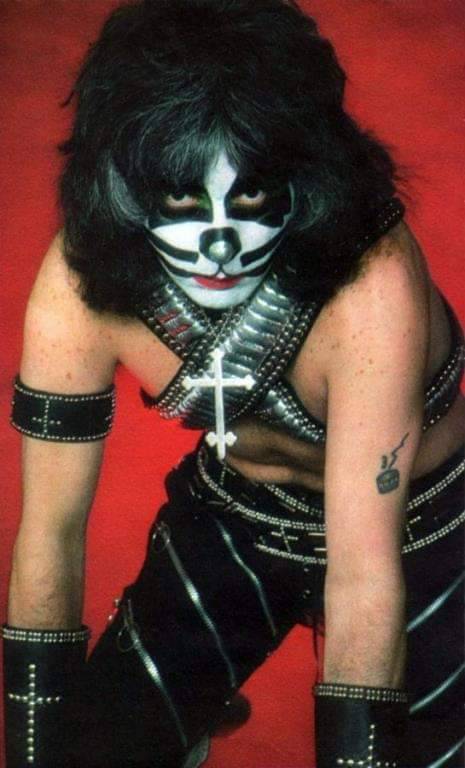

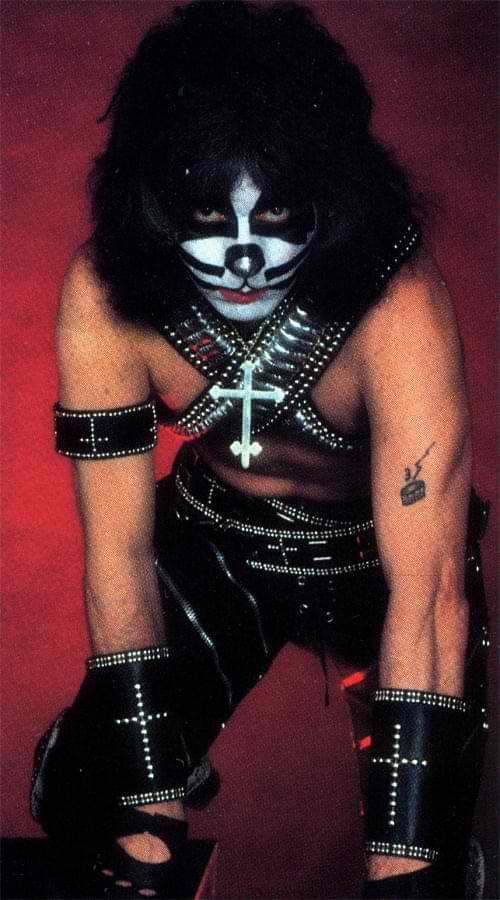
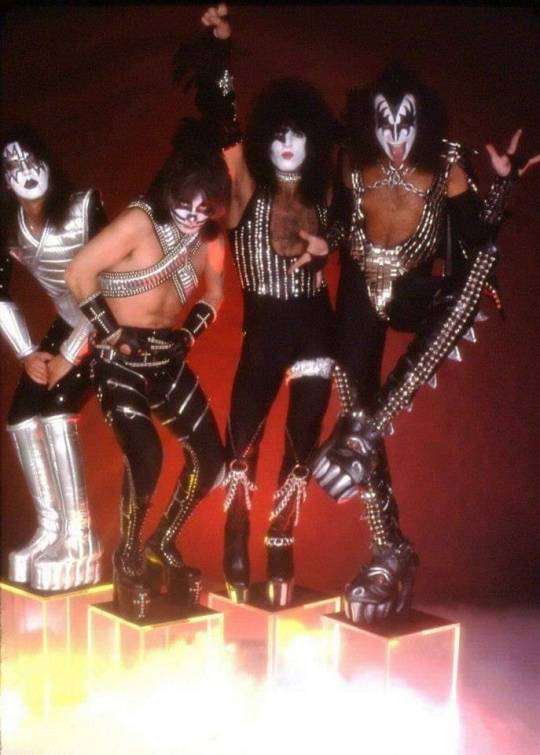



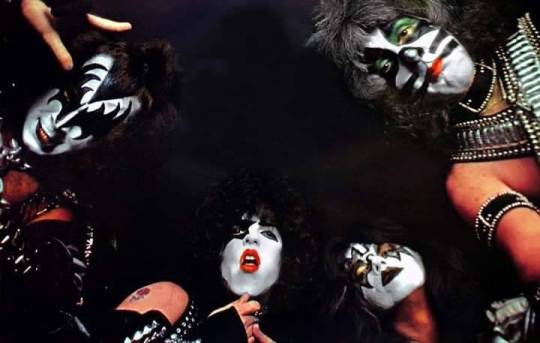

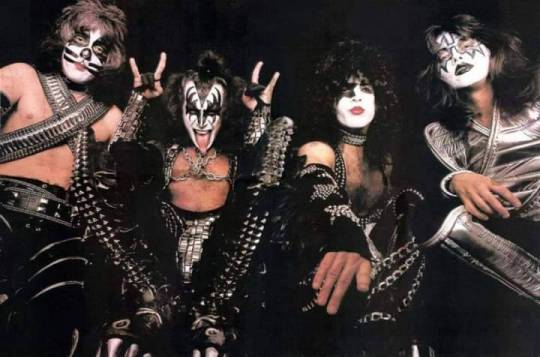
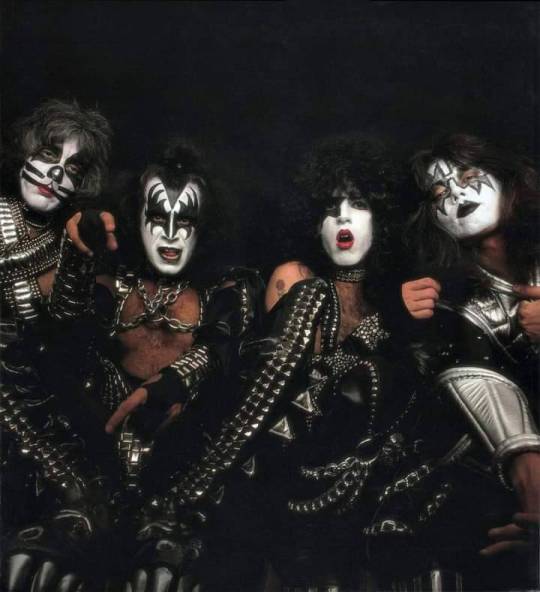

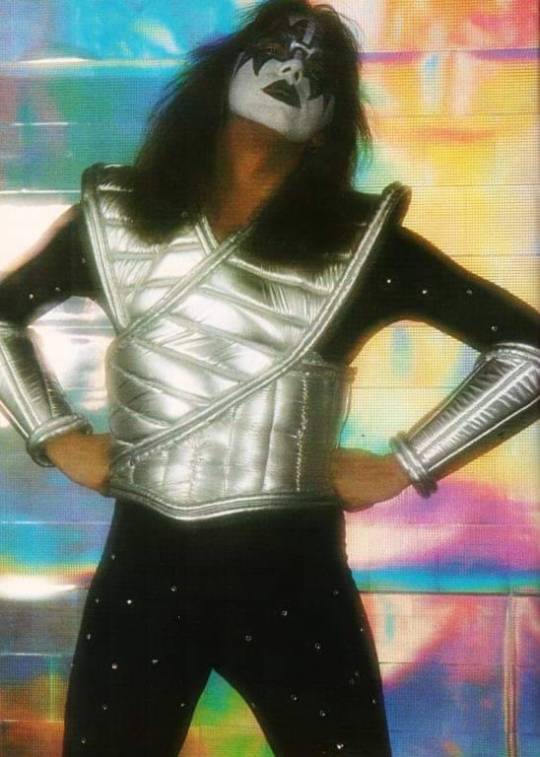

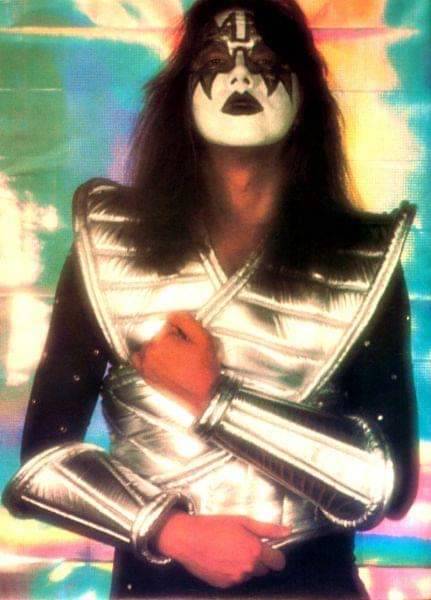

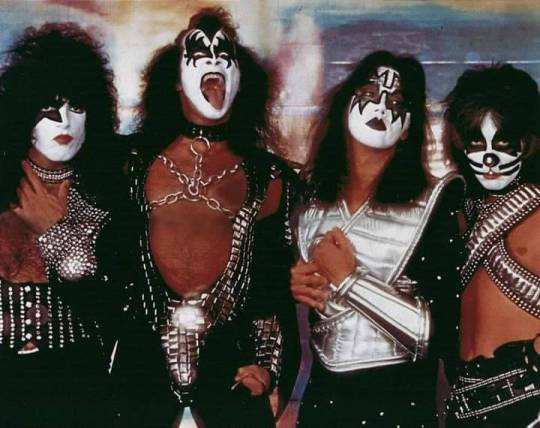
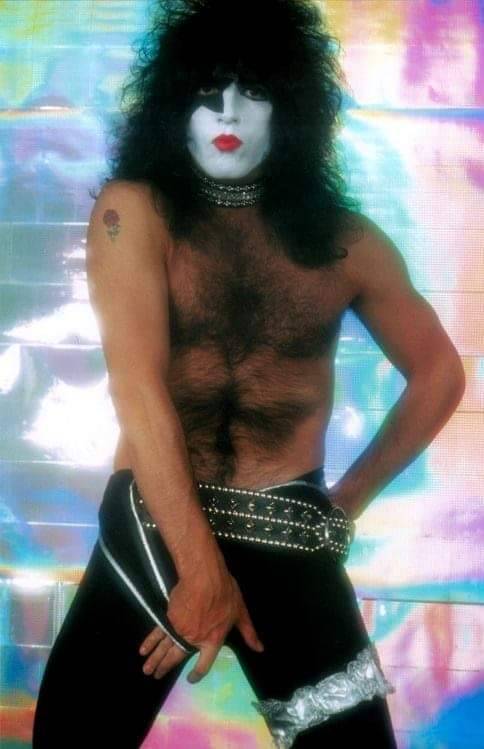

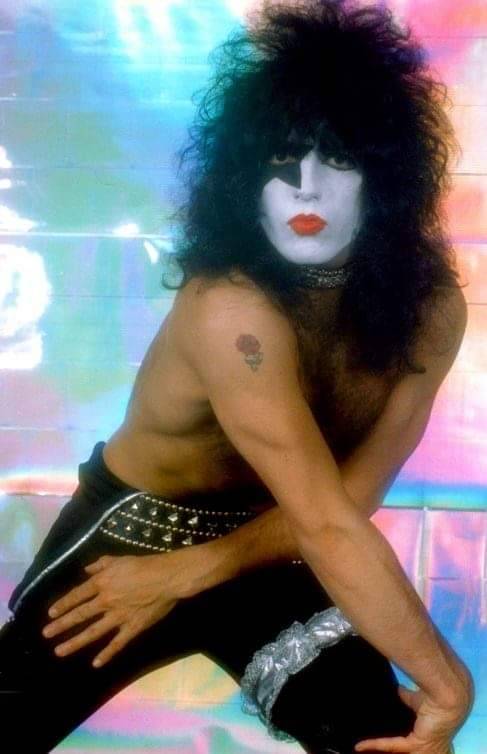

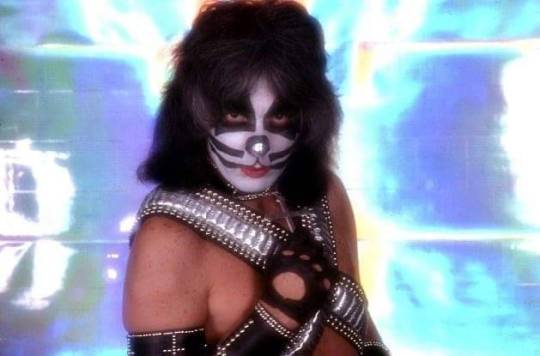
April 28, 1977
Love Gun Photo Sessions
Barry Levine’s Studio - Los Angeles, California
📸 Barry Levine
"We experimented a lot with everything. That’s how the series with the wildly multicolored, shimmering mylar background happened. It was 1977 and we had to do a Love Gun promotional shoot. I set it up in my studio and I wanted to get a series with different colors in the background because we had been using a lot of blacks and greys up to that point. I got these colored mylar sheets and reflected some plain white light from them, sometimes adding just a little bit of blue gel to the mix. I pulled the light a little out of focus because the patterns on the sheets were very odd, and I wanted to get really vibrant colors and images from the mylar. These shots appeared on magazines and newspapers all over the place. Some mylar shots, as well as other images I photographed, were included on the cover of KIϟϟ’ World Tour 77-78 program. If you look really carefully, you can tell that those same shots were the photo models for the gatefold etchings inside Double Platinum, as well as the solo album covers, although we didn’t have either of those projects in mind when we decided to shoot that day
Although I had shot many bands before KIϟϟ, I knew the second they stepped into my studio, they were in a class by themselves. Techniques that worked with other bands, didn’t fly with KISS. And the difference in style between individual members was vast. I quickly became familiar with their distinct personalities and became adept at pulling certain traits out of each of them as needed. When they’re onstage, they simply metamorphosize into their unique band personas, but in the studio, it was up to me to pull a Demon, a Spaceman, a Lover and a Cat out of the four guys who showed up. They all knew how to capture their onstage personas, but sometimes I had to go the extra mile to get just the right facial expression or stance.” - Barry Levine
KIϟϟ’ new costumes (Love Gun) were constructed by Maria Contessa and Laurie Greenan, and the band traveled with three of each of the outfits while on tour. Gene and Ace used slightly altered versions of the original design for touring purposes. The total cost for the new production, including the new stage, costumes and instruments, was $194,910, although the show was hyped as a million-dollar production in most markets.
#kisstory#kiss#1977#love gun#ace frehley#peter criss#paul stanley#gene simmons#the spaceman#the starchild#the catman#the demon#kiss the band#kiss band#kiss army
51 notes
·
View notes
Text
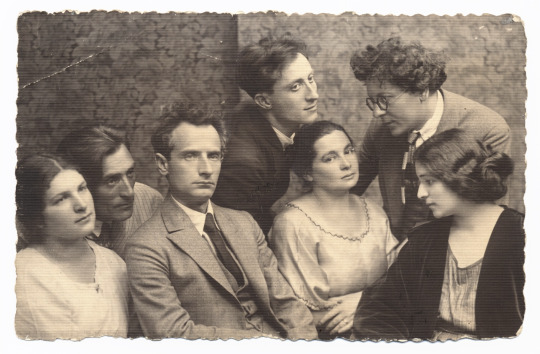
Yiddish writers, Warsaw, 1922
From left to right, with short biographies:
Esther (Esye) Elkin (?–?) was the wife of Mendl Elkin.
Mendl Elkin (1874–1962) was born to a family of Jewish farmers in Belarus. Though working as a dentist for six years, he was more interested in arts and culture, and would spend his spare time writing for socialist newspapers and acting in an amateur Russian-Yiddish theatre group. He spent the 1910s–1920s between Bobruisk and Siberia before moving to Vilna and founding a theatre group, as well as editing literary journals and writing poetry. He would later move to New York, where he served as Chief Librarian for YIVO.
Peretz Hirschbein (1880–1948) was born near Grodno; his father operated a water mill. He studied at a yeshiva before becoming a Hebrew teacher. In his 20s he began to write poetry and plays in both Hebrew and Yiddish, and would soon move to Odessa to stage his plays. After his theatre troupe disbanded in 1910, he spent the remainder of his life travelling, finally moving with his wife Esther Shumiatcher to Los Angeles.
Uri Zvi Grinberg (1896–1981) was a Yiddish writer before moving into Hebrew. Born into a Hasidic family in what is today Ukraine, he served in the Austro-Hungarian army. Radicalized by the November 1918 pogrom in Lwów, he spent the interwar period between Palestine and Europe. He co-founded the self-proclaimed fascist group Brit HaBirionim and later served as a Member of Knesset for Herut. He was awarded the Bialik Prize three times, as well as the Israel Prize for his contributions to literature.
Khane Kacyzne (?–?) was the wife of Alter Kacyzne. Together they had a daughter, Shulamith, who survived the Holocaust by hiding as a non-Jew. Khane was murdered at Bełżec.
Alter Kacyzne (1885–1941) was a prolific photographer and writer, born to a bricklayer and a seamstress in Vilna. He took up photography early, at age 14, by which point he had also taught himself Hebrew, Polish, German, Russian, and French (alongside his native Yiddish) and had begun to write poetry. Through the interwar period he worked as a photojournalist, travelling extensively, as well as serving as editor for several literary magazines and writing for communist newspapers. He was beaten to death by Ukrainian fascists in 1941, and his wife Khane was murdered at Bełżec extermination camp.
Esther Shumiatcher (1896–1985) was born in Grodno, though her family emigrated to Alberta, Canada in 1911. Interested in poetry and screenwriting, she worked several jobs to make money: as a waitress, in a meat-packing plant, and helping her family run a boarding house out of their home. In the 1920s she went to Warsaw and worked extensively as a poet; her poem "Albatros" gave its name to a modernist Yiddish journal. She was married to Peretz Hirschbein, whom she met while he was taken ill in Calgary and nursed back to health in her family's home. After her husband's death in 1948, she moved to New York.
From the YIVO Archives.
#yiddish#yidishkeyt#jewish#jewish history#uri zvi greenberg#uri zvi grinberg#esther shumiatcher#peretz hirschbein#perets hirshbeyn#alter kacyzne#khane kacyzne#mendl elkin#esther elkin#1922#jumblr
68 notes
·
View notes
Text
America Ferrera's breakthrough career
I just want to point out that this woman has delivered 2 cinematic, historical, browsing, impeccable speeches about the frustrations I feel about being a woman. And that actress of course is the one and only America Ferrera herself. Let's talk about her debut role in the movie — Real Women Have Curves. The 2002 independent film based on the play by Josefina Lopez is one of my all-time favourite movies I have watched in my lifetime. And if you somehow know this movie through another suspicious Greta Gerwig connection, I implore you to watch this. The movie was directed by Patricia Cardoso. At the time when it was released, America Ferrera had already filmed another movie but this movie debuted first putting her on the map. She was only 17 years old! Josefina López wrote the play when she was 18 years old. In 2019 it was the first Latina directed film to be included in the National Film Registry at the library of Congress. Taking inspiration from her real life, Josefina wrote Real Women Have Curves about Ana, mostly centered on her relationship with her mother Carmen, played by Lupe Ontiveros. This movie is touted, not only for its representation of women in their real bodies, it also delivered a warm and loving portrayal of Latina families and neighborhoods in Royal Heights and East Los Angeles. Again this isn't a time where Latinas, even today, are represented in a full and nuancent light. So to not only have this Latina family but to have them placed in East Los Angeles which has been criminally and stereotypically portrayed as "dangerous", really meant something and still means something today. And the message of that film being "there's so much more to me than my weight". I think this might serve as a comfort watch for many women around the world.
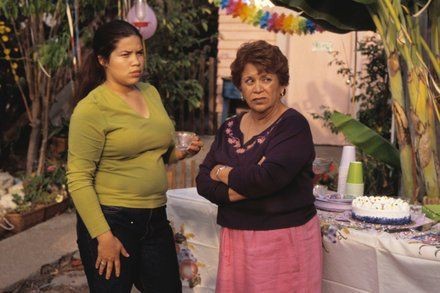
I don't understand how we were made to believe as children, that America Ferrera was the biggest woman to ever grace our tv screen. The Sisterhood Of The Traveling Pants is what I call perfection in cinema. If I ever will have a daughter in the future, she is required to watch this movie. Because every little girl needs to understand what sisterhood and what community is. I feel like girls today are not watching sisterhood displayed on television, or even in movies. It's always these toxic relationship, these toxic friendship — not to say that neither of those can't be toxic and bad, because even within this friend group they all have their own issues with each other, with their families etc. But it's not about the problems, it's how they solve them, how they come together. And I feel like this message should be displayed for the young girls today. And I just love how diverse the friend group is, because nowadays it seems like every teenager I see on tv are like the same skinny, white blondes. If you haven't seen this movie make sure to have a box of tissues nearby because it's going to make you cry.
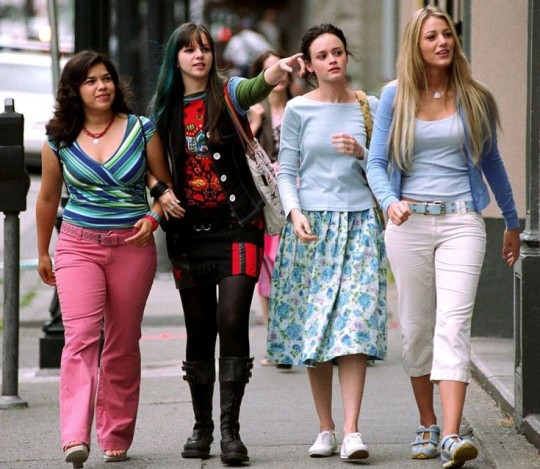
The dark side of pretty privilige is, you don't get to be funny, intelligent, respected — you just get to be pretty. So I've just finished watching Ugly Betty, I fully recommend, and I realised the only female character who's actually respected within this show, is Betty. If you don't already know the concept, Betty gets hired to be the assistant to the chief. Because he sleeps with his assistants, they decide to get him an "ugly" girl so he won't sleep with her. But she's hired for Mode, which is kind of like Vogue/Cosmo type of magazine. So naturally she gets bullied. They treat her like crap because she doesn't look like the ideal Mode girl. But the crazy thing is, since none of the men want to sleep with her, they actually respect her. They start to treat her like a human being with ideas. Then she becomes one of the most liked people by anyone in their team. On top of that, all of these gorgeous women get treated like absolute crap. No one listens to them, their ideas are not heard, and they're not respected. So it leaves a very clear message: wether you are gorgeous or "ugly", misogyny will still hunt you down and it will catch you. For Betty, men don't look twice her way. They treat her bad from the moment they see her. Just because they don't want to sleep with her, they don't find her attractive. For the beautiful women in the show, like Amanda who is painted as the gorgeous blonde, men only want to sleep with her, and they don't see that she's smart. Go back to watch the show and you'll see how horribly the other women get treated compared to Betty (and they have some good cameos in this show).

As we are reaching the end, we can claim America Ferrera as "that girl". The term is, in my opinion, used for anyone who dresses like a fashionista and acts like the queen they are. But it's much more than that. I think, to achieve that title you have to be also impactful and encourage other women to be what they want to be. America really proved it by playing the Emmy Award winning role of Gloria in Barbie, directed by Greta Gerwig. I think every cis, heterosexual white male should be forced to sit down and watch this movie. The message behind the Barbie movie is about going from being a girl to being a woman. Barbieland is what our childhood felt like; we were safe, naive, independent and everything seemed perfect. The real world is what womanhood actually is. It's scary, sexist, there's pain and we're faced with so many challenges, while still being held to unrealistic expectations by society. "We mothers stand still, so our daughters can look back to see how far they've become". America Ferrera's speech about how hard it is to be a woman, really affected me and made me tear up in the theather. "It is literally impossible to be a woman. You are so beautiful, and so smart, and it kills me that you don't think you're good enough. Like, we have to always be extraordinary, but somehow we're always doing it wrong. You have to be thin, but not too thin. And you can never say you want to be thin. You have to say you want to be healthy, but also you have to be thin. You have to have money, but you can't ask for money because that's crass. You have to be a boss, but you can't be mean. You have to lead, but you can't squash other people's ideas. You're supposed to love being a mother, but don't talk about your kids all the damn time. You have to be a career woman but also always be looking out for other people. You have to answer for men's bad behavior, which is insane, but if you point that out, you're accused of complaining. You're supposed to stay pretty for men, but not so pretty that you tempt them too much or that you threaten other women because you're supposed to be a part of the sisterhood." America Ferrera the woman you are, thank you so much for helping me and other women to believe in theirselves. Happy international women's day! <3
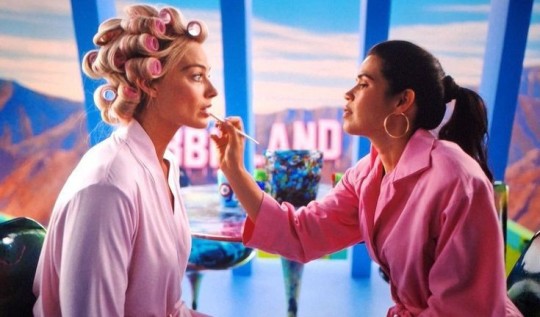
#america ferrera#barbie#real women have curves#the sisterhood of the traveling pants#ugly betty#feminism#womens history month#international women's day#margot robbie#greta gerwig#movies#history
21 notes
·
View notes
Text
Rebecca Schaeffer was a promising young actress and model, best known for her role in the television series "My Sister Sam." Tragically, her life was cut short at the age of 21 due to an act of violence committed by an obsessed fan.
In the years leading up to her murder, Schaeffer had unknowingly attracted the attention of Robert John Bardo, who became fixated on her. Bardo had a history of troubling behavior, including stalking other women, and he became obsessed with Schaeffer after seeing her in a magazine. His fixation escalated over time, leading him to track down her personal information.
In July 1989, Bardo traveled to Los Angeles, located Schaeffer's address, and approached her home. On July 18, he knocked on her door, and when she answered, he pulled out a gun and shot her in the chest. The attack was sudden and brutal; Schaeffer was rushed to the hospital but succumbed to her injuries shortly after arriving.
Bardo was arrested shortly after the murder. During the trial, it was revealed that he had a history of mental illness and had been previously hospitalized for psychiatric reasons. He was found guilty of first-degree murder and sentenced to life in prison without the possibility of parole.
Rebecca Schaeffer's tragic death prompted discussions about stalking and the dangers that celebrities can face from obsessive fans. It led to increased awareness about the need for stronger anti-stalking laws and protective measures for public figures. Her case remains a poignant reminder of the potential consequences of unchecked obsession and the impact of celebrity culture on individuals’ lives.
10 notes
·
View notes
Text
Milestone Monday
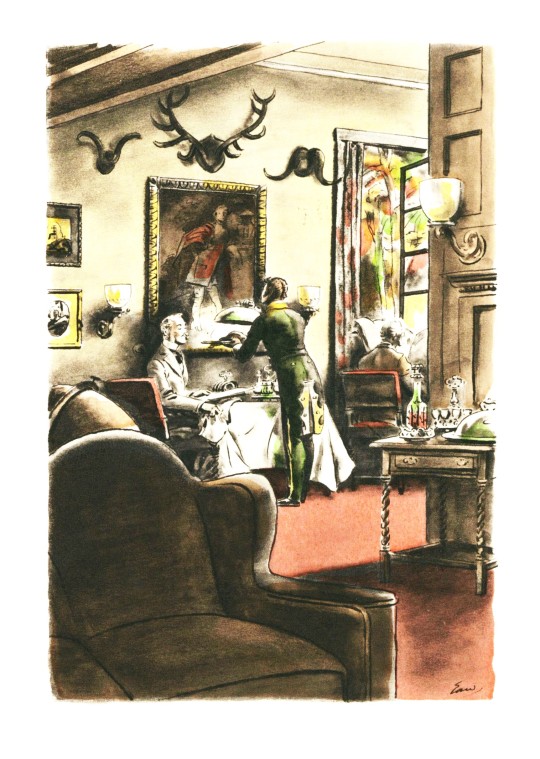
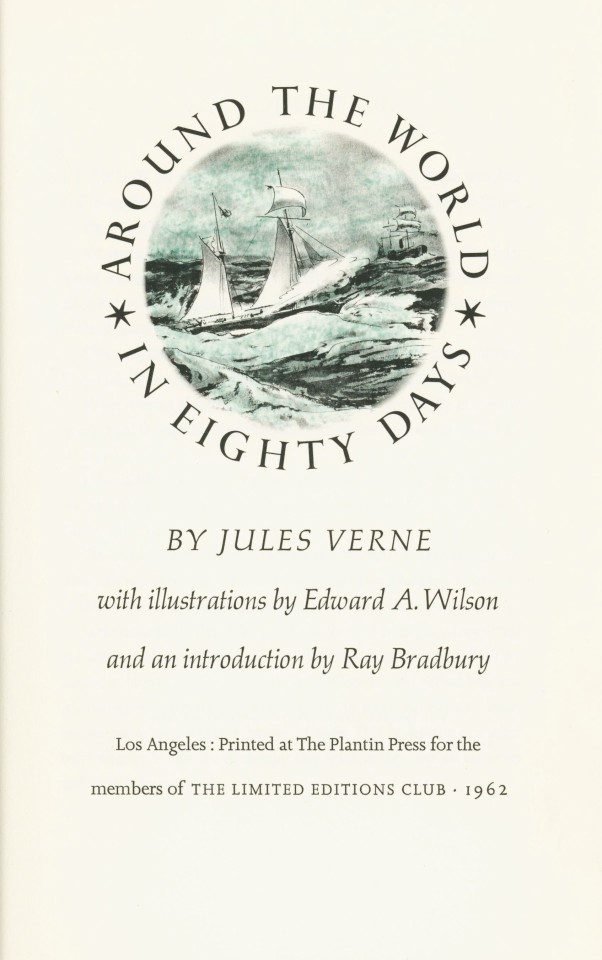
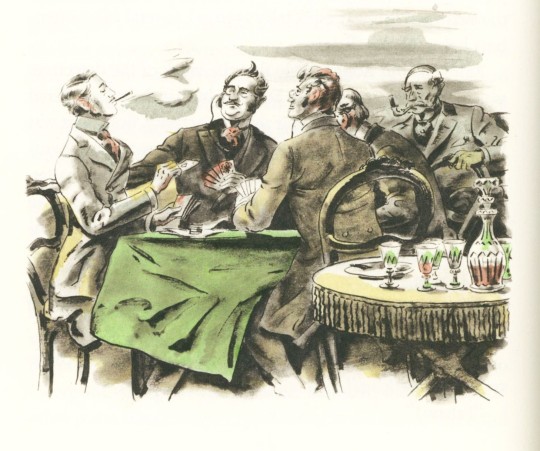
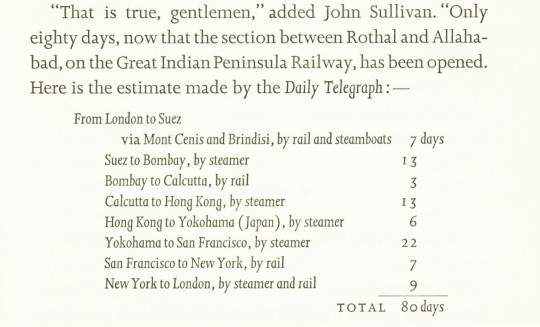
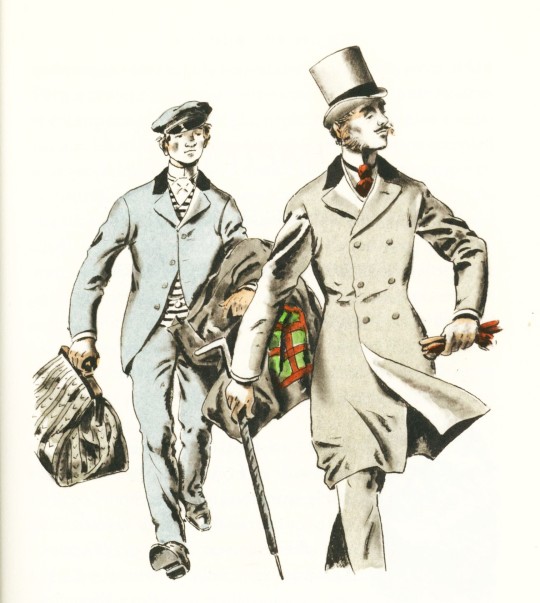
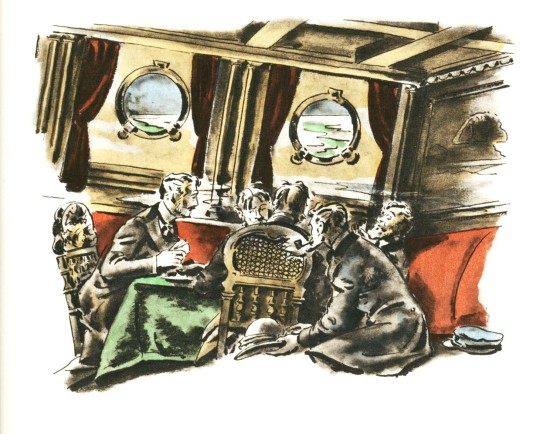
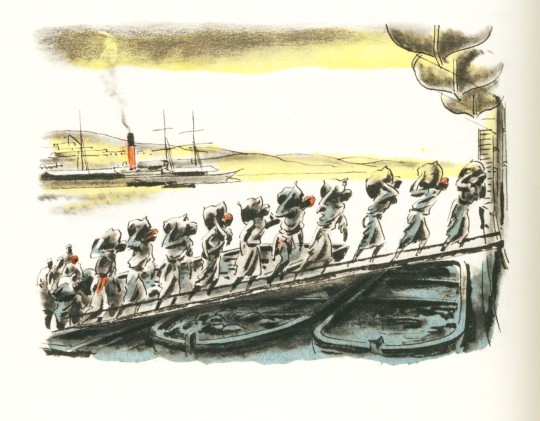
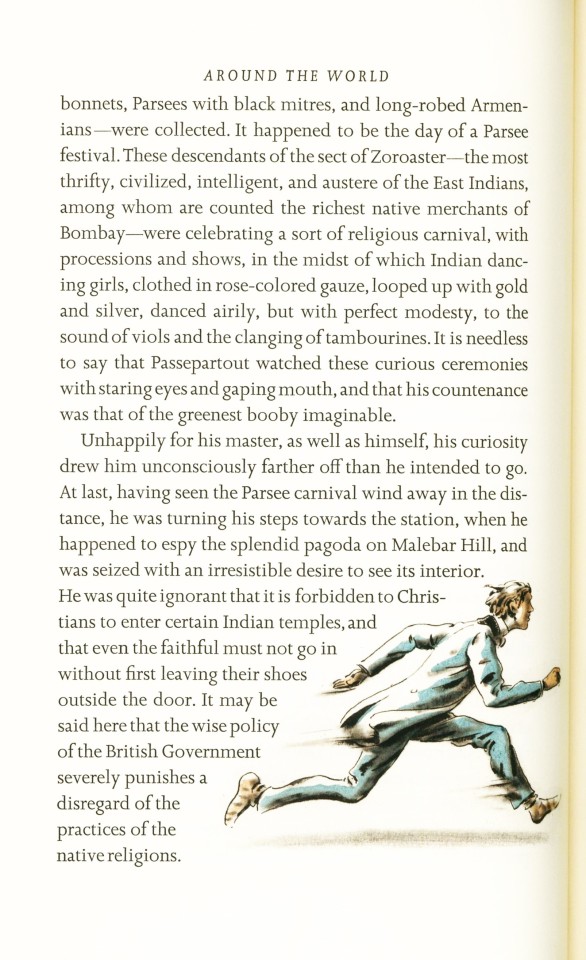
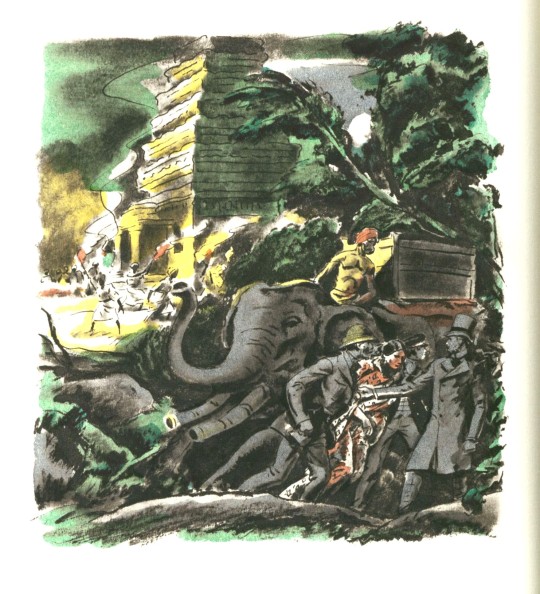
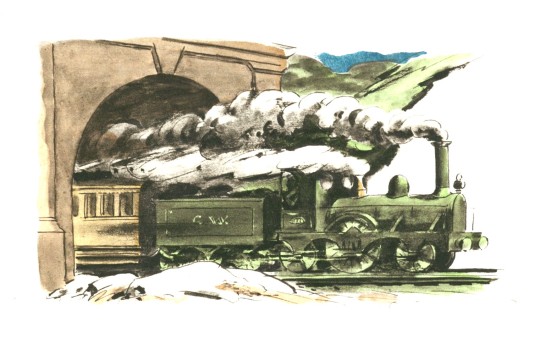
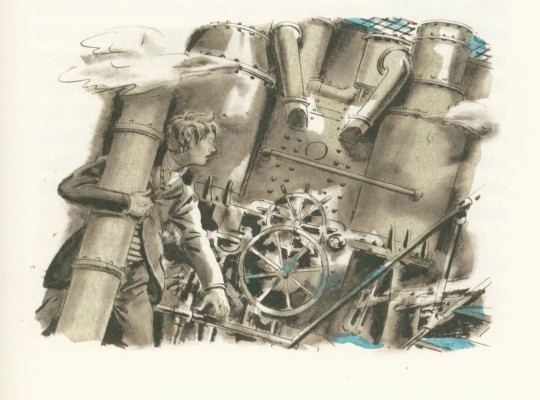
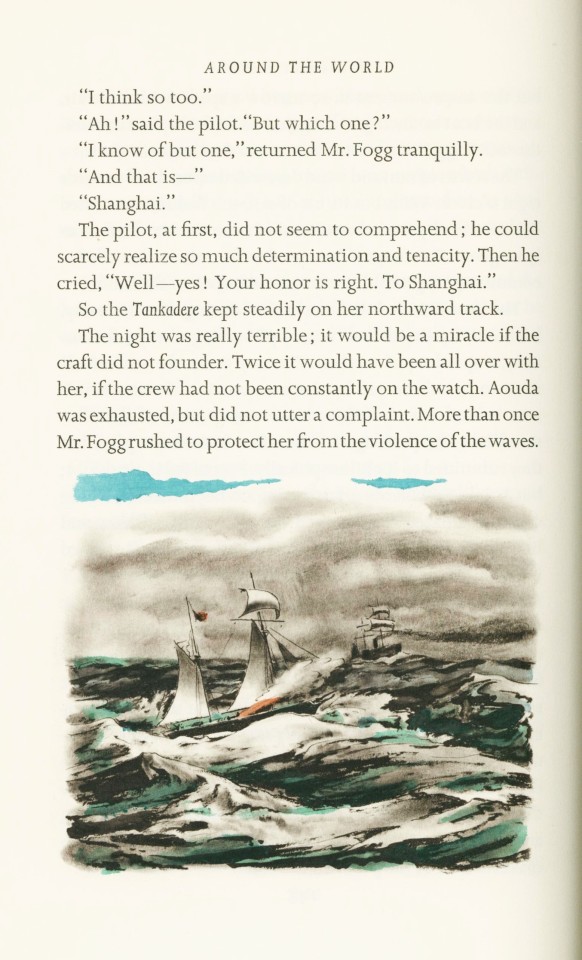
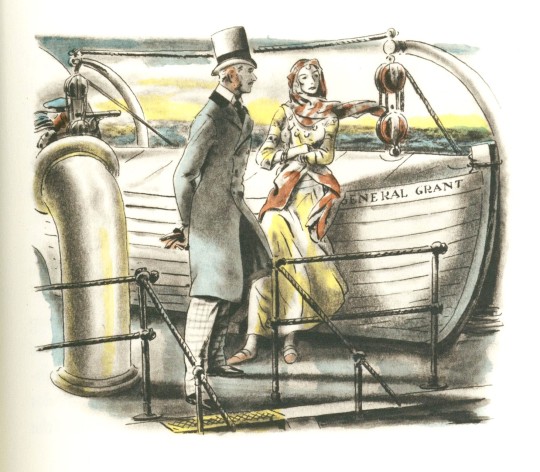
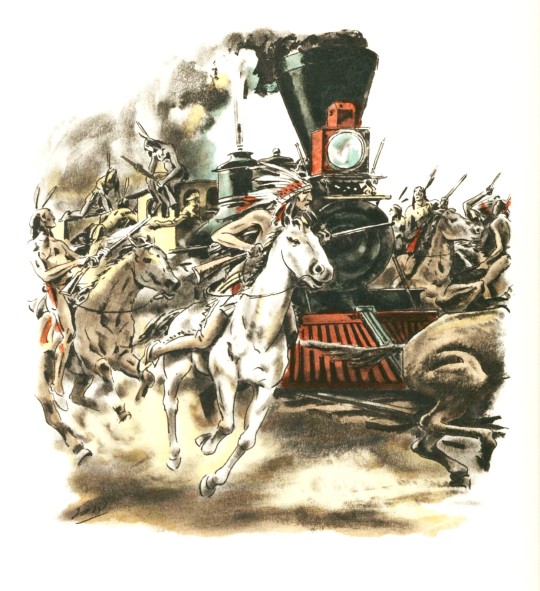
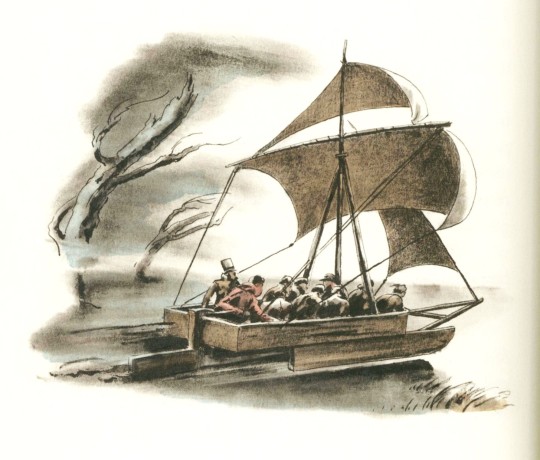
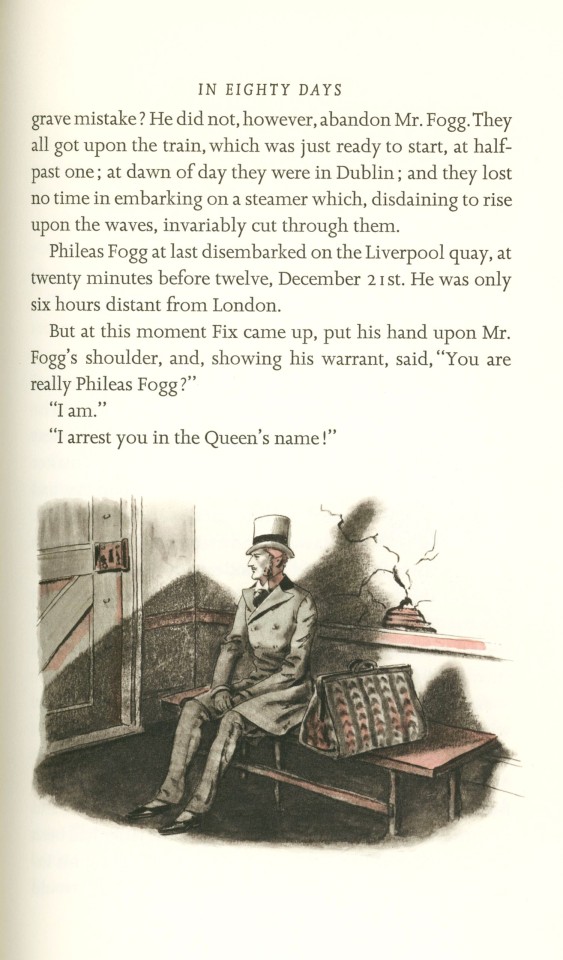
On this day, October 2, 1872, Jules Verne (1828-1905) sent his protagonist Phileas Fogg out on the adventure of a lifetime in his novel Around the World in Eighty Days. On the evening of October 2nd, while at the Club playing cards and debating how the world has grown smaller since a new railway section in India had made it possible to travel around the world, Fogg accepts a wager from his comrades for £20,000 to follow the Daily Telegraph’s itinerary of steamers and rails around the world and make it back to London in eighty days.
In observance of this fictional anniversary, we’re looking at The Limited Editions Club (LEC) publication of Around the World in Eighty Days written by Jules Verne and illustrated by Edward A. Wilson (1886-1970). It was published in 1962 and printed in an edition of 1500 copies by Saul and Lillian Marks at The Plantin Press in Los Angeles, California. The illustrations consist of sixteen pen-and-wash drawings by Wilson, reproduced in gravure by the Photogravure and Color Company of New York and then colored by hand in the studio of Walter Fischer.
Wilson, an attendee of the Art Institute of Chicago, illustrated over a dozen books, magazines, and World War II propaganda posters between 1924 and 1950. His vibrant work within LEC’s Around the World in Eighty Days reinforces a sense of wanderlust and adventure throughout the novel. In an eerie coincidence, October 2, 1970 is also the day Wilson passed away after a long struggle with an undisclosed illness.
The Special Collections holds number 289 of this limited-edition publication, from long-standing LEC member Austin Fredric Lutter of Waukesha, Wisconsin.
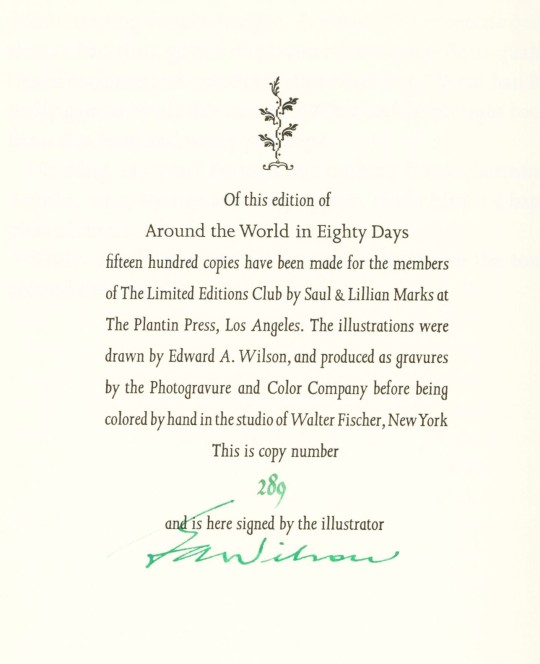
View more Limited Edition Club posts.
View other Milestone Monday posts.
-Jenna, Special Collections Graduate Intern
#milestone monday#milestones#around the world in eighty days#jules verne#Phileas Fogg#edward a. wilson#limited editions club#lec#plantin press#Saul and Lillian Marks#illustrations#Walter Fischer#Photogravure and Color Company
30 notes
·
View notes
Text
Tenipuri Complete Character Profile - Ryoma Echizen

[PROFILE]
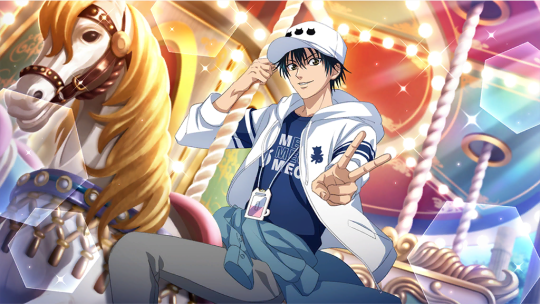
Birthday: December 24th (Capricorn)
Blood Type: O
Birthplace: Los Angeles
Relatives: Father (Nanjirou Echizen), Mother (Rinko Echizen), Cousin (Nanako Meino), Cat (Karupin)
Father’s Occupation: Temple Priest (local)
Elementary School: Los Angeles Saint Youth Elementary School
Middle School: Seishun Academy Junior High School
Grade & Class: First Year | Class 1-2 | Seat 3
Club: Tennis Club (Regular)
Committee: Library Committee
Strong Subjects: English, Chemistry
Weak Subjects: Science Experiments, Japanese
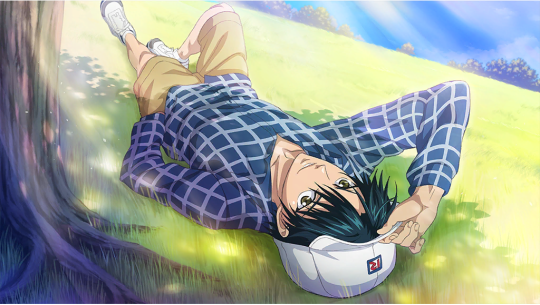
Frequently Visited Spot at School: Under the big tree behind the school building
World Cup Team: U-17 World Cup USA Representatives ➜ U-17 World Cup Japanese Representatives
Favorite Motto: “All or Nothing.”
Daily Routines: Playing with Karupin
Hobbies: Bathing with bath salts from Japan’s famous hot springs ➜ Clearing games he’s borrowed, watching cat videos [23.5]
Favorite Color: Silver
Favorite Music: J-Pop
Favorite Movie: Any kind of Hollywood film
Favorite Book: Monthly Pro Tennis ➜ TENNIS LIFE (an American tennis magazine) [23.5]
Favorite Food: Grilled fish (with little bones), chawanmushi, local confections [23.5], shrimp senbei (plum and kimchi flavor) [removed]
Favorite Anniversary: Any day he can play tennis
Preferred Type: A girl that looks good with a ponytail
Ideal Date Spot: Santa Montica Third Street Promenade ➜ Santa Monica Pier Pacific Park [23.5]
His Gift for a Special Person: “Just tell me what you want.”
Where He Wants to Travel: A snow-viewing hot spring
What He Wants Most Right Now: Nintendo DS ➜ Nintendo 3DS [10.5 II] ➜ A smart watch [23.5]
Dislikes: Waking up early, cleaning the temple floors [removed], paparazzi [23.5]
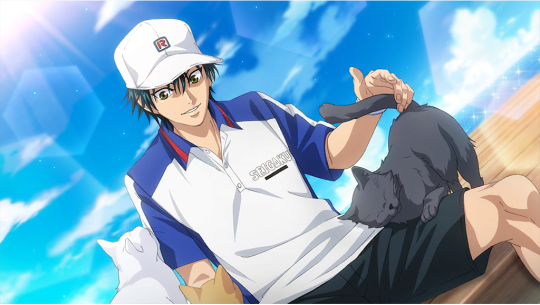
Skills Outside of Tennis: Animals take a liking to him for some reason, can cleanly peel fruit [23.5], horseback riding(?) [TP]
Spends Allowance On: Fanta/Ponta
Routine During the World Cup: Soaking in an open-air bath
[DATA]
Height: 151cm ➜ 152.5cm [23.5]
Weight: 50kg ➜ 47kg [23.5]
Shoe Size: 24cm
Dominant Arm: Left
Vision: 1.5 Left & Right
Play Style: All-Rounder
Signature Moves: Twist Serve, Drive A, Drive B, Drive C, Drive D, Cool Drive, Selfless State, Pinnacle of Perfection, Samurai Drive, Hope [23.5]
Number of Times His Friend’s Visited Him While Abroad: 7.8 times a month
Favorite Brands:
Hats: FILA
Clothing: FILA
Racket: BRIDGESTONE (DYNABEAM GRANDEA)
Shoes: FILA (Mark Philippoussis Mid)
Fitness Test Results:
Side Steps: 71
Shuttle Run: 119
Back Strength: 102kg
Grip Strength: 42.3kg (left)
Backbend: 59.5cm
Seated Forward Bend: 39cm
50m Run: 6.1 seconds
Standing Long Jump: 237cm
Handball Throw: 28m
Endurance Run (1500m): 4:46
Overall Rating: Speed: 4 / Power: 3 / Stamina: 4 / Mental: 5 / Technique: 5 / Total: 21
Kurobe Memo: “Even though many areas already have a high degree of perfection, I suspect it’s highly likely he’ll continue to grow and improve. I would like to see him work on building his body without sacrificing balance.” [RB]
[POSSESSIONS]
What’s in His Bedroom [10.5]:
Trophies from past competitions // They’re placed randomly since he doesn’t really care for them
Alarm clock on his bed // The alarm doesn’t necessarily wake him up…
TV and game consoles // He has several types of game consoles but keeps the one he uses the most (Nintendo 64) connected to the TV
Closet // Where his school uniforms are stored. His mother will put them away if they’re left out
His pajamas he’s left out // He’s always in a rush when he gets ready for school
Karupin’s favorite cat toy // A cat tail toy
What’s in His Bag [10.5]:
A beginner’s guide to doubles // He bought it after playing doubles with Momoshiro. He forgot it was in there
Notebook // His math notebook he forgot to take out
Photos of Karupin // He insists that he didn’t put them in there
Notepad // He’s written down emergency phone numbers since he’s always late
Pen case
Game Boy Advance // Bought for him as a starting school gift, he plays it during his free time
Senbei // He drinks Fanta/Ponta when eating senbei
What’s in His Locker at the U-17 Training Camp [10.5 II]
Game console // A PSP. He’s absorbed in video games when he’s not playing tennis and has recently been playing a tennis game
Photo of Karupin // It’s one of his favorites
Fanta/Ponta // Grape flavor
Senbei // Having Fanta and senbei together is a must
What’s in His Travel Bag [23.5]:
Shio senbei from Okinawa // Gifted to him by Tanishi to celebrate his return to team Japan
[TRIVIA]
The Prince of Tennis 10.5 Fanbook | Publication Date: 11/02/2001
Although he’s lived in the USA, he still prefers Japanese food and isn’t fond of Western food
People tend to be aggravated by him due to his abrasive personality, but he means no ill-intent by it
He gained his arrogant and abrasive personality from growing up in the USA
He will speak his mind regardless of how it sounds as he believes it’s a way of being kind
His first name is written in katakana rather than kanji. It’s alluded that it may be due to his mother being another nationality besides Japanese
Konomi had Ryoma wear a hat since he thought it was cool, and wanted people to associate his FILA hat with him
He is called “Shorty” by Kikumaru but does not mind it since he states height doesn’t matter in tennis
He likes grape-flavored Fanta/Ponta
He keeps everything he needs for school in his tennis bag, hence why he gets confused when some items are still in it
His personality is described as pessimistic, but shy, gentle and always striving for improvement
Konomi originally did not intend for him to be the protagonist. The role was originally going to be given to Kintarou, with Ryoma being his rival. He initially thought Ryoma would be difficult to portray as a protagonist, be better as a sub character and that making him the protagonist would dampen the mood of the series. He eventually decided on Ryoma and built the other characters around him
Konomi describes him as a “bad guy,” and that him defeating people who are even worse is a focal point of the series
The Prince of Tennis 20.5 Fanbook | Publication Date: 12/04/2003
He is described to easily get engaged in a single subject and then excel in that area
When he concentrates, he will become so absorbed in what he’s doing that he will not pay attention to his surroundings
He is described to be suited for professions that require special skills, such as a pilot or astronaut
He is very susceptible to change and has an insatiable desire to become stronger
One of his favorite subjects is chemistry since the science behind the substances changing, combining and gaining different properties reminds him of tennis
He does not remember when he started playing tennis, and states he thinks he’s been playing it since he was born
His secondary sport would be soccer
The Prince of Tennis 40.5 Fanbook | Publication Date: 12/04/2007
He is described to be sociable and lively, but doesn’t get too involved in his personal relationships and tends to be reserved
His friends and schoolmates often visited his house when he lived in the USA
He did not know what “Old Maid” was until he played it at the joint training camp with Rokkaku
In Genius 305, when he had won his match against Atobe and everyone huddled around him, someone had quietly handed him the shaver, but it’s a mystery on who it was
He considers Kintarou to be quite strong, and wouldn’t mind having an official match with him someday
He is the character Konomi states he has the least in common with, the second being Tezuka
The Prince of Tennis II Official Character Guide: PairPuri Vol. 2 | Publication Date: 12/04/2009
He takes naps around the training camp along with Jirou
The Prince of Tennis II Official Character Guide: PairPuri Vol. 4 | Publication Date: 02/04/2010
He had gotten his hat mixed up with Sanada’s
The Prince of Tennis II Official Character Guide: PairPuri Vol. 5 | Publication Date: 03/04/2010
He likes his grilled fish with not many bones and finds removing them to be annoying
The person he currently dislikes the most is his father
If he had a long vacation, he would go play tennis on the western side of Japan since he states they have strong opponents
He wants to win all four major world tennis championships
When asked what kind of plant or animal he is like, he replies with a cat since they’re free-spirited
When asked what his current goals are, he replies that he wants to fight more stronger opponents and win against them
He is named after Ooka Echizen, also known as Ooka Tadasuke
Konomi came up with his “Selfless State” technique since he wanted to write a story where the main character’s dormant power would awaken when faced against an unbeatable enemy. And since Ryoma was a returnee, he had him speak in English to surprise the audience and give his scenes a fantasy-like feel
Konomi corrects his statement that Ryoma didn’t win national USA junior tournaments four years in a row, he had meant that when Ryoma started tennis, he had competed and won in regular USA junior tournaments four times in a row
Konomi states he has tried drawing Ryoma more mature as the series progresses and draws Ryoma’s shoes and racket bigger to make him appear smaller
One of His School Days:
6:30am - Woken up by his cousin
6:45am - Eats breakfast while half-asleep, goes to school
7:30am - Late for morning practice, does 30 laps
8:40am - 1st Period: Math, half-asleep and dozing off
9:40am - 2nd Period: English, Grammar, half-asleep and dozing off
11:00am - 3rd Period: PE, bar exercises
12:00pm - 4th Period: Geography (quiz)
12:50pm - Lunch, buys bread at the school store after eating lunch
1:10pm - Gives in and buys and drinks milk
1:20pm - 5th Period: Science I (physics), is sleepy from eating
2:20pm - 6th Period: Japanese (classic literature), thinks of ideas for volleys
3:20pm - Library Committee meeting, wasn’t listening
4:00pm - Club activities, earnestly practices volleys
5:30pm - Stops by Momoshiro and a CD shop, then returns home
6:00pm - Dinner, bathes (with bath salts from Beppu Onsen)
6:30pm - Rallies with his father
10:30pm - Plays with Karupin while listening to music
11:00pm - Falls asleep while playing games on his bed
The Prince of Tennis II Official Character Guide: PairPuri Vol. 9 | Publication Date: 09/02/2011
Mifune’s eagles are shown to be fond and gentle towards him
The Prince of Tennis II 10.5 Fanbook | Publication Date: 09/04/2013
He texts his mother everyday asking her to send him pictures of Karupin
He quickly became friends with the dogs at the training camp
The Prince of Tennis II 23.5 Fanbook | Publication Date: 05/02/2018
When he and Ryoga were younger, they went out to play and had gotten lost for three days. They eventually managed to hitchhike home
Konomi had originally intended to show him being anxious about joining team USA, but then being helped by them to join team Japan again
Konomi states he may continue his and Fuji’s match in the rain
The items Horio had brought to the camp for him were Fanta/Ponta
The Prince of Tennis 20th Anniversary Book: Tenipuri Party | Publication Date: 08/02/2019
He did not mind playing for team USA and states the country doesn’t matter as long as he can play tennis
He did not care about being on the same team as Ryoga and had actually wanted to play against him
He states he felt some changes when viewing team Japan from an outside perspective
He returned to team Japan because he had thought of the people who made him stronger and wanted to fight alongside them
28 notes
·
View notes
Text
New Interview: Scandinavian Music Magazine Gaffa

Alex Turner interviewed in Scandinavian music magazine Gaffa. 31.10.22
I’ve translated the interview (find it below the cut), but as with all laymen-translated interviews, take it with a grain of salt. The interview was obviously done in English, which the journalist then translated into Swedish words, which I in turn have turned back into English. When presented with a choice of words to use, I’ve tried to choose words I think Alex would use. Still, we all know Alex likes to take pauses and start sentences over, which is not at all apparent in the interview. You know how it is. I for one don’t in a million years believe that he rambled on about the World Cup as undisturbed as it’s made out to be in the last paragraph.
Arctic Monkeys Interview November issue of Gaffa 2022, by Jesper Robild
A Sci-fi Hangover in a Toyota
With the album The Car, Alex Turner is back on Earth. Gaffa’s reporter Jesper Robild travels to Los Angeles to meet Arctic Monkeys’ frontman, who takes his time and talks about getting a unique energy from the tournament fever.
When he steps into the minimal, presently closed hotel bar in his current hometown Los Angeles, Turner is equal parts rock hero and eccentric introvert. Stylish in way too many clothes with regards to the 31 degrees Celsius outside, and he chooses an astride position on a hard chair rather than to share the sofa. At the same time, he is slightly evasive, reticent, often dragging his fingers halfway through his hair and fastening his gaze at the floor when he for the tenth time takes 20 seconds to begin an answer in five different ways before sentences form, accompanied by hands that juggle his thoughts. Five days earlier, the death of Queen Elizabeth II was announced.
“The football was cancelled. I think there was some Champions League match that needed to be moved because they didn’t have enough police officers. I can’t sum it up succinctly. It’s a unique situation. Unique.”
“I didn’t know it was going to be this record”
Four years ago since Tranquility Base Hotel & Casino, three and half years without any concerts, and this is one of the first interviews he does after three years of silence. The new album The Car demanded a lot of attention. And time.
“I’ve started jogging every now and then, a couple of kilometres, which is an improvement. That kind of exercise has never been for me before. But mostly I’ve consciously devoted time to this record and things connected to it. I’ve spent a lot of time during the last six months on the shaping of the live show and a bit of film stuff that has to do with the record. When the tour in 2019 ended, I started writing music immediately. There was no pause at all this time, no period for me to try to be inspired. I didn’t know it was going to be this record, I don’t necessarily think I knew it was even going to be a record. I tried to deal with it very quickly, but it didn’t work of course, and here we are three years later.”
Everything became clear with the first seconds in the first song, There’d Better Be a Mirrorball, something Alex returns to many times.
“When it comes to most of the records, there is a moment where I realised which direction it would take, and that can be quite thrilling. I had had the instrumental introduction for the song for a long time, and then this moment came about when I found a way to connect and transform it to more of a song. It doesn’t quite start as a pop song, but it gets there eventually. When I discovered that transition, a bit of how the lyrics would be, and the synth loop that is repeated throughout the song, I knew what the record would be like. What I didn’t realise was that it would take a further two years to find things that could work around it.”
“Obviously down-to-earth title”
The drummer Matthew Helders has said in an interview with NME that the album continues where the last one left off. But if a hotel and casino complex on the moon is as weird as it gets, a car would have to be the opposite.
“I at least present it like we’re back on Earth, but when I look back on the songs, there’s more of a sci-fi hangover than I perhaps realised. But there are no carton models of space hotels nearby. The title is quite obviously down-to-earth. After calling a record Tranquility Base Hotel & Casino, you’re easily attracted to calling the next one The Car.
The album title is the easiest explanation possible to the lone Toyota Corolla that crowns the cover.
“It’s a photograph that Matthew took a few years back, and I fell in love with it the first time I saw it. I directly felt that if we were to package the record in that picture, it wouldn’t feel like such a bad idea. It’s as if the photograph gives permission to the idea that the record could be called that. “The Car” were also two words that I realised that I kept repeating in the lyrics. And if you’re going to be a bit cynical, when you realise you say “the car” in three songs, you stand at a crossroads - either you go all in and call the record that or you find another way with the lyrics. And by laziness, I chose the first alternative. No, that’s not it.”
“The lyrics are part of something else”
No matter how little you care about lyrics, it’s difficult not to raise your eyebrows at Turner’s whimsical, almost dadaistic habit of wrapping his thoughts in slightly nonsensical metaphors. Unexpected words that call for attention are constantly recurring - just take a title like Jet Skis on the Moat.
“I know what you mean with lyrics passing you by. I feel like I don’t pay them much attention either. When I’m listening, that is. I don’t automatically think that I need to isolate the lyrics from everything else that’s going on in the song, from the other components: the music and the melody. I’m very interested in the relationship between those three things and think that they give each other permission to behave in a certain way. That’s how I think about it when I write songs. I don’t feel that you need to care about the lyrics when you’re listening. They’re part of something else. Sometimes, they’re in Italian or something and you don’t have to worry about it then.
In an interview with NME almost ten years old to the day, Alex talked about how he in the beginning of his career saw John Lennon’s I Am the Walrus as a sort of unattainable template for a type of song he wished that he could write. When questioned whether he has got closer to an imagined ideal, he begins with half a minute’s worth of silence.
“It’s not like there’s an idea in the distance that I’m getting closer to. Again, it’s not about the lyrics but about the composition as a whole. There’s something close to what you’re asking about, but the instrumental introduction right at the start of the first song is as much part of what everything is about on this record as the words. I remember when I talked about I Am the Walrus. When I was 16 and heard those kinds of lyrics I naively thought that they would be easier to write because they didn’t give much meaning. But I quickly realised that it’s harder. I don’t know if I’m closer to being able to write a song like that now, haha. I think I missed that departure. But if we break it down further - the lyrics subscribe to the composition as a whole in that song. The words are in line with everything else that’s going on, the melody, the production… And I could probably draw a weak parallel between that and what’s going on in our records. There’s also a crumb of humour in that song that’s important not to forget.”
Does it take courage to weave in humour?
“It probably took some balls to declare that ‘I am the eggman.’ I don’t know if courage is the point… Perhaps it takes some courage to follow the instinct that tells you to go in a humoristic direction and sing it. It’s important to me to have a little humour amid all the heartbreak.”
When we get onto more parallels to The Beatles among fans and media - something that six No 1’s on the British album charts have caused, not the least - Alex is very careful to not make it sound like he brought up the subject.
“What are we discussing now? You’re saying that people sometimes compare Arctic Monkeys with The Beatles? I didn’t know that was common. I haven’t listened to them in a while. If I’m going to come up with my own comparison… They were a band who didn’t end musically where they started, in broad terms. There was an idea of experimenting with pop music, which I’m very positive about. I think the comparisons might have to do with that. It feels like there never is a risk if we were to stay in the same place, not even when we have tried to. The making of a record is something that lives its own life. Every time I happen to repeat myself nowadays, it doesn’t really work.
Multitracks himself
15 years after the debut Whatever People Say I Am, That’s What I’m Not, and with seven albums under his belt - plus two with the side project The Last Shadow Puppets - Alex Turner is truly not stuck where he and Arctic Monkeys began. Garage indie and post-punky britpop has gradually evolved and has on The Car landed in a relaxed appearance with crooner vocals, cinematic strings, and a lounge ambiance equal parts noir as jovial. On his 30th birthday in 2016, Alex Turner was given a piano as a birthday gift by the band’s manager, which led to a shift in main instruments when it came to songwriting. But despite the guitar getting relatively little space in the soundscape on The Car, Alex Turner has given it more attention than the last time.
“It feels like I play more guitar on this record. And some of the songs were written on guitar. But I suppose that after having played more piano and having written more on piano, new possibilities arose, so it’s different now when I write on the guitar. Just how I think about how everything goes together is slightly different from when we wrote Brianstorm, for example, or something else from the second record. Perhaps it’s less about whether it’s guitar or piano and more about thinking in other terms as a band. Not “Everybody’s going to do this for 16 bars.” And I suppose that the song structures are more different now. It might not be apparent, but there’s that distinction in my head. Back in those days, we often put things together in a way very much based on the idea of the rehearsal room. Now I put it together more on the basis of the studio environment.
It feels like it’s easy to romanticise the rehearsal room. Do you miss that way of playing and writing?
Yes. But at the same time, speaking of methods to look ahead, it’s something you can leave behind. My writing process the last ten years has been a lot about multitracking myself. That’s the biggest difference between the old records and the last two plus the last Shadow Puppets record. That I make demos of myself. That has probably changed things more than that there’s a piano in the picture. We’re rehearsing this weekend and it’s actually pretty exciting, it doesn’t happen that often except for before tours. We’re thinking that we aren’t going to look back, but I don’t know. It’d probably be fun to approach a new record like that someday. If you leave something, an idea or method, for long enough, it might become something else that makes things happen.
It doesn’t feel unusual that rock dinosaurs around 65 do that, rehearse together and record live.
“Haha, dinosaurs! Exactly, “just like in the old days. I’ll keep that in mind.”
Recording and the Euros
Arctic Monkeys aren’t quite back with any nostalgic devices just yet. The Car was recorded in the Suffolk countryside at Butley Priory, a building that was constructed to house Augustinians in the 12th century.
“It’s not a place I was particularly acquainted with, still aren’t. It was just our provisional studio for a few weeks. It was a lovely experience. We hadn’t spent any time together for a year or so, and it was wonderful to be back together again.”
It was only here that the other three members made their mark on the material.
“I had my 16mm camera and spent quite a lot of time filming when we were all making the record. It was mostly to preserve the memories, I suppose, but I had worked on the songs on my own for quite some time, and bringing the camera meant that I had to take a step back sometimes. Everybody could contribute then. And when I was putting new film in the camera or something it created a buffer, perhaps not enough, but the others got a bit of space.
The recording during the summer of 2021 coincided with the European Football Championships that had been delayed since 2020. A component that enhanced the experience, and does that in many contexts.
“Some games were played during the day, and we had to take a break then, but I suppose that depended on how important it was to see Austria play, for example. Did they play?
Yep.
And Sweden, too, right? Didn’t we face you? Or no, that was in the World Cup in 2018. That was a pretty stale match. It’s easy to become completely engrossed when those tournaments are going on, you become so invested. The World Cup is soon, I’m looking forward to that. It gives the band a unique energy, but it also shows in the environment. It’s been apparent when we’ve toured during the World Cup… There’s something about that tournament fever.
301 notes
·
View notes
Text
FStS Character Intros
Here are the character intros for From Strangers to Lovers 😁 The story starts off in the middle of May, 2002 and it takes place in Los Angeles mostly but also in Hollywood.
Robaire Dumont
Age - 21 (turning 22 in 2002)
Birthday - July 23rd, 1980
Zodiac sign - Leo
Likes - Gogo, coffee, traveling, books, music, singing,
Dislikes - Phlegm, olives
Gogo Parker
Age - 21 (turning 22 in 2002)
Birthday - July 4th, 1980
Zodiac sign - Cancer
Likes - Robaire, Junto (her dog), Japanese pudding, coffee, rain
Dislikes: Raspberries, cough syrup
Miranda Del Flores
Age - 22
Birthday - March 6th, 1980
Zodiac sign - Pisces
Likes - Natalie, dresses, strawberry lemonade, modeling
Dislikes - Stalkers, kiwi
Natalie Bennett
Age - 22
Birthday - January 11th, 1980
Zodiac sign - Capricorn
Likes - Miranda, cookies, suits, driving, cuddling with Miranda
Dislikes - Homophobes, raisins
Ken Parker
Age - 24
Birthday - January 2nd, 1978
Zodiac sign - Capricorn
Likes - Avani, eer, comedy, takoyaki, dogs
Dislikes - Cats, spiders
Avani Khatri
Age - 22 (turning 23 in 2002)
Birthday - December 10th, 1979
Zodiac sign - Sagittarius
Likes - Ken, shopping, pictures, snowflakes, hearts
Dislikes - Sand, cucumbers
Jesse O'Connell
Age - 25 (turning 26 in 2002)
Birthday - June 22, 1976
Zodiac sign - Cancer
Likes: Veronica, pottery, his family, art, his friends, kid photos
Dislikes: Unrollable sleeves, people who bad mouths his family
Veronica West Cassidy
Age - 26
Birthday - April 21st, 1976
Zodiac - Taurus
Likes - Jesse, her family, caramel, rock music
Dislikes - Flies, mustard
David Davis
Age - 22 (turning 23 in 2002)
Birthday - September 11th, 1980
Zodiac sign - Virgo
Likes - Gogo, cocoa, cars, soccer, bartending, his family, his friends
Dislikes - Bar fights, oranges (because he’s allergic)
Aaron Zhou
Age - 22
Birthday - February 5th, 1980
Zodiac sign - Aquarius
Likes - T, sports, dancing, sweatbands, Hip Hop, dumplings
Dislikes - Spiny cacti, sharing his feelings
Aaron Martinez Topher
Age - 19 (turning 20 in 2002)
Birthday - November 20th, 1982
Zodiac sign - Sagittarius
Likes - Z, hype, overalls, sweets, hats
Dislikes - Banana peels, scars
Aaliyah Jackson
Age - 21
Birthday - March 2nd, 1981
Zodiac - Pisces
Likes - Perris, spending money, clubbing, heels
Dislikes - Gogo, not getting her way
Davina Dumont
Age - 47
Birthday - March 15th, 1955
Zodiac - Pisces
Likes - Antoine, steak, cooking competitions, wine
Dislikes - Ants, headaches
Antoine Dumont
Age - 46 (turning 47 in 2002)
Birthday - December 1st, 1955
Zodiac - Sagittarius
Likes - Davina, Gardening, veggies, black coffee, vegan hot dogs
Dislikes - Steak, hot sauce
Kyoko Olsen
Age - 24 (turning 25 in 2002)
Birthday - August 3rd, 1977
Zodiac - Leo
Likes - Finneas, kitties, peaches, babies, sweet tea
Dislikes - Fish, smudging her glasses
Finneas Olsen
Age - 25
Birthday - January 28th, 1977
Zodiac - Aquarius
Likes - Kyoko, dogs, button ups, bacon
Dislikes - Mud, thunder
Terena Smith
Age - 36 (turning 37 in 2002)
Birthday - October 30th, 1965
Zodiac sign - Scorpio
Likes - Managing, spa days, burgers, magazines, cooking
Dislikes - Crazy fans, ignorance
Tae-young (Tae Young) Lee Lim
Age - 17 (turning 18 in 2002)
Birthday - October 21st, 1984
Zodiac sign - Libra
Likes - Wildlife, spicy food, painting his nails, stuffed animals
Dislikes - Overcooked noodles, roaches
Runa Furuta
Age - 34 (turning 35 in 2002)
Birthday - August 8th, 1967
Zodiac sign - Leo
Likes - Yuko (her cat), chocolate covered strawberries, flowers, rice
Dislikes - Ranch, grapes
#4town fanfic#4townie#4town#oc#fanfic#original character#robaire#jesse 4town#4town taeyoung#aaron z#aaront#character info#my characters#robaire x oc#aaron z x aaron t
7 notes
·
View notes
Text
This Chinese American Aviatrix Overcame Racism to Fly for the U.S. During World War II
A second-generation immigrant, Hazel Ying Lee was the first Chinese American woman to receive her pilot’s license
by Susan Tate Ankeny - Smithsonian magazine, April 23, 2024
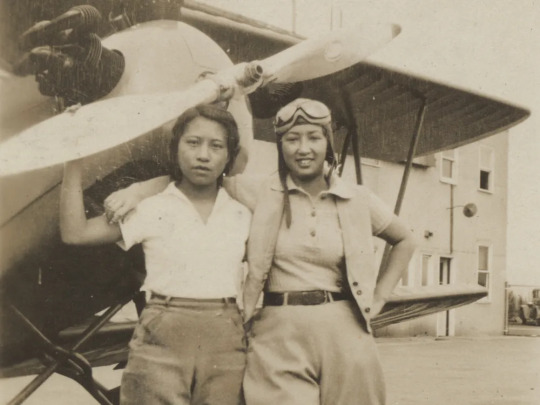
Hazel Ying Lee (right) and fellow pilot Virginia Wong (left). Courtesy of the Museum of Chinese in America, New York City
Hazel Ying Lee circled the biplane, looking for anything suspicious. Missing something on a precheck could cost you your life. She checked the engine and confirmed that no oil had collected in its lower cylinder.
Starting a Fleet biplane involved choreography. Lee grasped the propeller with one hand and pulled it backward. “Just walk it through. You don’t need to use force,” her instructor, Al Greenwood, yelled from the cockpit. She repeated the process four times; each time, she heard the click that told her she’d done it correctly. Then, with both hands on the propeller, she raised her left leg forward. Swinging it behind her for leverage, she pulled, and the unique thumping that identified the Kinner engine began.
After climbing onto the wing and into the cockpit, Lee inspected the instrument panel, starting with the fuel. The tank held close to three hours of fuel when full. If a car ran out of gas or had engine trouble, the driver could pull to the roadside. In flight, the best you could hope for was to find a good field, and quickly.
As 19-year-old Lee performed her preflight check in July 1932, Greenwood’s other training biplane, calledthe Student Prince, taxied down the runway, piloted by one of the Chinese Flying Club of Portland boys earning solo hours. Founded in 1931, Greenwood’s school trained Chinese American pilots to go to China and help defend against the invading Japanese.
These young men would become a vital part of Generalissimo Chiang Kai-shek’s stand against the invasion. As the head of China’s Nationalist government, Chiang and his party were trying to establish control in a nation divided among revolutionists, nationalists, Indigenous warlords, and a developing communist army and government. Now, Japan seemed determined to take China’s resources. Many Chinese Americans supported Chiang and believed he would help China emerge from years of strife and discord.
China’s fledgling air force, with barracks and hangars still being constructed in the north, was easily defeated by the Imperial Japanese Army Air Force. The Chinese needed pilots. Delegates traveled to the United States to scout out flying schools that could teach young Chinese American pilots to fly for China. Across the country, branches of the Chinese Consolidated Benevolent Association (CCBA), a group made up of local merchants and businessmen, agreed to help raise funds to train the young men.
youtube
The association was established in 1882 with the purpose of aiding and protecting Chinese Americans by providing assistance with housing, jobs and other issues that arose. Portland residents Chan Lam and Ting Lee made impassioned speeches to raise money for an aviation school, ultimately raising enough money to sponsor 36 local students. Chinese flight schools opened not only in Portland but also in Boston, San Francisco, Los Angeles and other cities across the country. In total, around 200 Chinese American pilots would undergo training at these schools before joining China’s defense against Japan. Before a student was accepted into the program, he had to pledge his life to China, to the interests of China and to Chinese aviation. The pledge to die for China would take precedence over any personal relationships that might develop.
‗‗‗‗‗‗‗‗‗‗‗‗‗‗‗‗‗‗‗‗‗‗‗‗‗‗‗‗‗‗‗‗‗‗‗‗‗‗‗‗‗‗‗‗‗‗‗‗‗‗‗‗‗‗‗‗
Greenwood had purchased the Prince exclusively for the students in his Chinese flying school. He was essentially running two businesses simultaneously. With the new school under his direction, most of his time was spent training young men for combat in China, but he continued to give private flying lessons to students like Lee.
Greenwood’s first class of 15 boys quickly became idols to Lee. For as many hours as she could spare, she watched them practice. They treated her like a kid sister, though all of them were about the same age, and good-naturedly tolerated her enthusiastic antics and questions. She was fun to have around, laughing and playing tricks on them, with a wide smile and deep-voiced wisecracks.
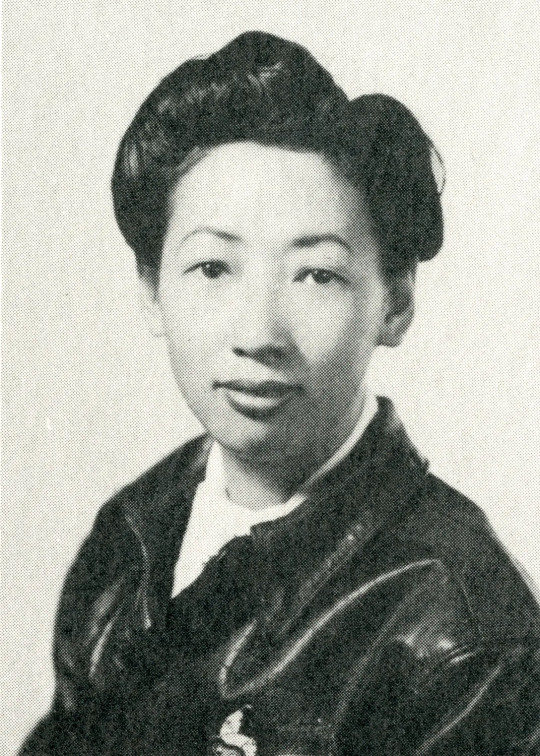
A 1943 photograph of Lee, then serving in the WASPs. Courtesy of Texas Woman's University Collection

Lee stands next to the Student Prince in 1932. Public domain via Wikimedia Commons
Lee had kept the photo of the first class that appeared in the Oregonian newspaper in January 1931. Looking like a motley crew of street urchins, the young men posed in front of the Prince, uncertain of what they were in for before Greenwood began his process of transforming them into pilots bound for war.
Lee had never been among others who shared her passion for aviation. Flying was all that Greenwood’s students talked about, and they knew as much about airplanes—and sometimes more—than experienced pilots. It was practice that they needed, practice flying. And Greenwood would provide it.
The “boys,” as Greenwood called them, proved to be able students, a little heavy on the control stick at first, but never lacking courage or a willingness to try anything. Training required ten hours of primary work and ten hours of advanced aerobatics from each student—an enormous task for one instructor. Other pilots were hired to provide instruction to the students.

Lee (in white) attends an air show in Shanghai in 1936. Public domain
Greenwood peppered his instruction with stories of his exploits, like one about his narrowest escape, to demonstrate the deadly consequences of fear. While practicing spins with a student, he’d turned the plane over at 7,000 feet and let it spin for about 5,000 feet. The student grabbed the stick, panicking, and, as a magazine article about Greenwood described it, “began to do things, all of which were wrong,” while using up nearly every one of the remaining 2,000 feet before Greenwood finally regained control—just before the wheels hit the tips of the grass. Controlling fear was essential no matter what happened in the air.
‗‗‗‗‗‗‗‗‗‗‗‗‗‗‗‗‗‗‗‗‗‗‗‗‗‗‗‗‗‗‗‗‗‗‗‗‗‗‗‗‗‗‗‗‗‗‗‗‗‗‗‗‗‗‗‗
Born in Portland in 1912, Lee was the second of eight children born to Chinese immigrants. After she discovered her love of aviation at age 19, Lee began dressing like a flier, in baggy pants tucked into riding boots. People stared and pointed, talking behind their hands. “There’s the girl who is learning to fly.” “So foolish.” “Her poor mother.”
One evening, Lee and her friend Elsie Chang sat on the schoolyard grass in the gathering twilight, while Lee dramatically explained everything about flying, as if she were taking Chang along for a ride. Lee described what she could see while flying, how she steered the airplane, how the air made the plane rock and bounce, and all the dangers that needed to be avoided, like stalling on a landing. To Chang, it all sounded terrifying.
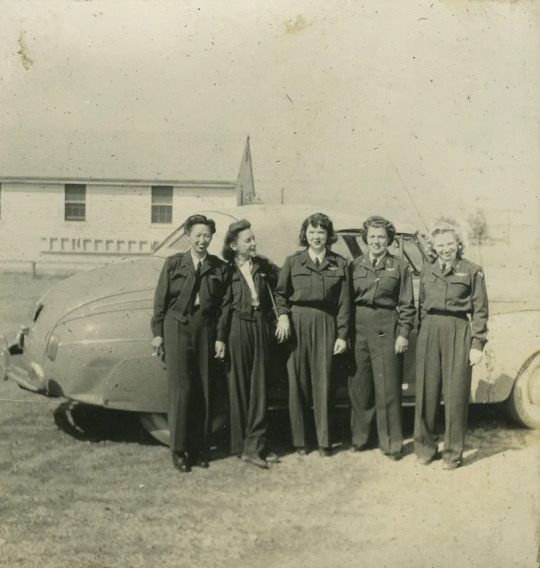
Lee (far left) served in the WASPs during World War II. Courtesy of Texas Woman's University Collection
Lee was such a good storyteller that Chang closed her eyes and felt the wind and the weightlessness and heard the engine and smelled the trees in the air aloft. They fell back on the grass and stared up at the darkening sky, waiting for the first star to flicker.
Lee told Chang that no other Asian American woman had a pilot’s license in the United States. She was going to be the first.
Lee counted the minutes until she could get back in an airplane, with the wind in her face and the lulling rumble of the engine to soothe her. She loved the speed, the rhythmic, percussive thump of the engine, the rush of air surrounded by the silent expanse of sky. Lee experienced a new kind of solitude. Away from her family and the tight quarters of a home filled with younger siblings, an elevator operator job where she had to try to be invisible, she was alone without any expectations or judgments. It didn’t matter that she was of Chinese descent. No one could see her race; no one could see her gender. In the sky, she wasn’t Chinese or American, man or woman, visible or invisible. She was just herself. In the sky, she felt limitless.
Lee refused to be tied to a home and children when there were more exciting things to do. She saw how conformity ruled women’s lives, offering a suffocating security in return. Women moved from their fathers’ homes to their husbands’, where their sons would have more power than they ever would. For most women, groomed to deny their own capabilities, to distrust themselves and defer to men, the decision to fly was fraught with fears, not only of flying but also of being independent. In an age when women were encouraged to stay grounded, Lee’s desire to fly was the ultimate expression of individuality. A husband might insist she give up flying, and that was something she would never do.
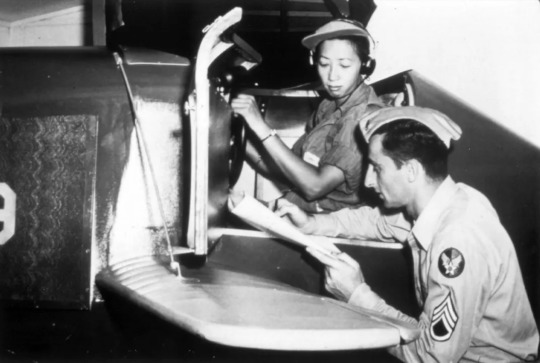
Lee reviews her performance after a session in a Link trainer. Public domain via Wikimedia Commons
If Lee could convince Greenwood and the CCBA to accept her into the next class of students training to go to China, she would sign the pledge without hesitation. To fly against the Japanese invaders would be the ultimate experience and worthy of any sacrifice. She’d die in battle fighting the enemy without any regrets. But the Chinese Flying Club, like all the related programs across the country, didn’t allow women. Lee decided that needed to change. There were few opportunities for a Chinese woman already. If she wasn’t admitted to Greenwood’s flying school, her future options were not just limited, they were unthinkable.
‗‗‗‗‗‗‗‗‗‗‗‗‗‗‗‗‗‗‗‗‗‗‗‗‗‗‗‗‗‗‗‗‗‗‗‗‗‗‗‗‗‗‗‗‗‗‗‗‗‗‗‗‗‗‗‗
In August 1932, Greenwood’s first class of 15 students eagerly awaited their departure for China, still heady from newspaper interviews and farewell speeches delivered at banquets in their honor. Four of the original 19 had failed to complete the class due to physical handicaps such as colorblindness. The proud graduates ready to embark on the adventure of a lifetime posed in front of the Prince in two rows, wearing tentative smiles and looking like boys not used to being photographed. Most wore ties, a few wore crewneck sweaters over white shirts, and several wore the bomber-style zip-up jackets popular at the time. They had learned more than flying under Greenwood’s guidance; they now believed themselves to be confident young men, no longer boys, ready to fight a war and, if necessary, die for China.
While the men of the CCBA wondered if these kids would have the toughness required to survive combat, Greenwood expressed an unwavering faith in his students. In an interview with Webster A. Jones of the Oregonian, Greenwood tried to deflate the accepted belief that people of Chinese descent could not possibly be as capable as white American pilots. “Chinese make rattling good fliers,” he said. “This myth about Orientals not being able to fly is pure bunk. They are as good as Americans—or other Occidentals—in natural ability, and they are superior in a lot of ways.”
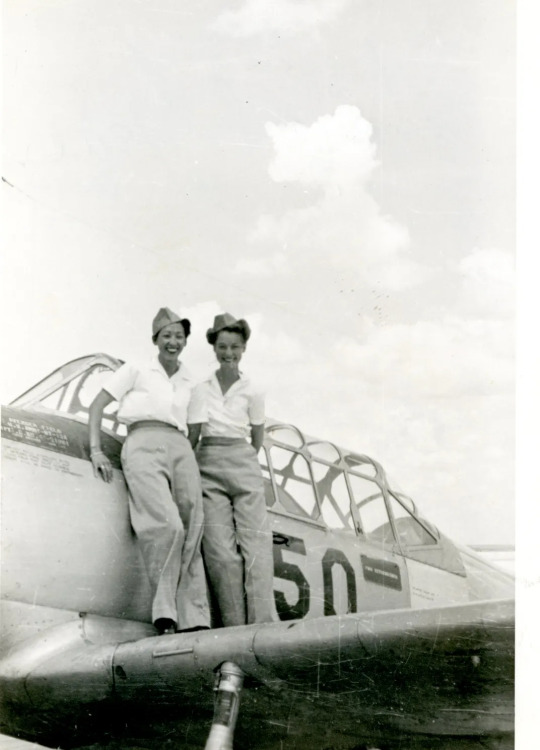
Lee (left) and Geneva Slack in 1943. Courtesy of Texas Woman's University Collection

L to R: Faith Buchner, Lee (standing on the wheel) and Grace Clark wearing “zoot suits” in 1943. Courtesy of Texas Woman's University Collection
After the graduates were photographed, Greenwood invited his other flying students to pose for a photo. Lee sauntered over to stand in front of the Prince,wearing wide khaki jodhpurs tucked into black riding boots, a polo shirt and a flight vest. Her goggles had been pushed up onto her flight cap. She took a drag from her cigarette and leaned back on the wing.
Greenwood recognized Lee’s transformation. She moved in a slow, confident stride, with a graceful swagger. Over the summer, she had made rapid progress and would soon fly solo. In a few short months, she had come into her own, and in doing so, had become something completely unique. Greenwood understood her need to be first, to compete with the boys and the girls, too. He smiled and nodded toward her as the camera shutter snapped.
Lee was as talented as any of the male fliers, but the CCBA had not yet granted permission. Since the Chinese elders and businessmen supporting the school paid all the training expenses for the students, they had to be convinced that girls were worth the investment. Greenwood’s latest argument, that the grant to train 36 students had not stipulated they be boys, proved incorrect. The contract called for “young men.” He would have to convince them that Lee was a crack pilot worthy of their financial investment. She had to pass her flying test to receive her license first, but that wasn’t going to be any trouble for her.
Greenwood became a fierce advocate for Lee, telling the Oregonian that she had received the same training as her male counterparts and was just as capable as them, if not more so. He believed Lee would prove his long-held belief that flying involved more finesse than muscle, and that keen intelligence was more important than brute strength.
Besides helping China defend itself against the Japanese invasion and having the opportunity to fly, Lee had another reason for wanting to go to China. Her father’s children from a previous marriage—her half-siblings—as well as her aunts, uncles and cousins still lived in the village where her father had grown up. This could be her chance to fulfill her dream of visiting her father’s homeland.
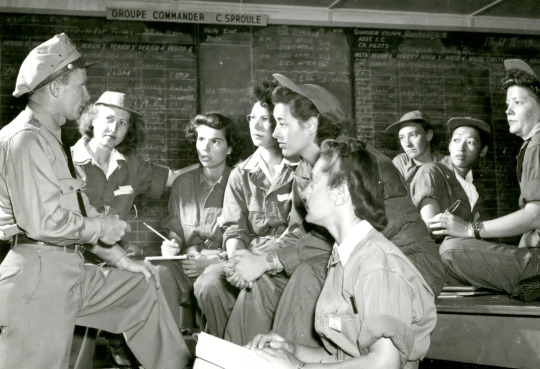
Ferrying trainees being briefed in the Ready Room. Lee appears at the center of the back row. Courtesy of Texas Woman's University Collection
On October 24, 1932, Lee passed the rigorous Department of Commerce pilot examination. Having also accumulated 50 flying hours, half of which were solo, Lee was granted a private pilot’s license. The document described her as a 5-foot-3, 117-pound woman. On November 1, the Oregon Journal reported on Lee’s achievement with the headline “Portland Elevator Girl Masters Flying and Gets License.” The reporter wrote, “The fifth floor of the H. Liebes & Co. [department store] was not high enough for Hazel Lee, 20, elevator operator there, so she got up early mornings to learn to fly an airplane. … Miss Lee took an airplane ride a year ago, got interested, and now that she can fly, she plans someday to go to China and interest women there in aviation.”
Lee was, in fact, the first Chinese American woman in the U.S., not just in Oregon, to earn a pilot’s license. (Katherine Sui Fun Cheung, born in China in 1904, earned her pilot’s license a few months before Lee and was the first woman of Chinese descent to do so in the U.S.; she later became a naturalized citizen.) Over the next decade, Lee would fly planes in both China and the U.S., becoming one of just two Chinese Americans accepted into the Women Airforce Service Pilots (WASP) during World War II. She died at age 32 on November 25, 1944, two days after her plane collided with another aircraft and burst into flames. “Of the 1,102 women who [flew] in the WASP program, 38 died in service,” notes the Federal Aviation Administration. “Lee was the last.”
Adapted from American Flygirl by Susan Tate Ankeny. Published by Kensington Publishing Corp. Copyright © 2024 by Susan Tate Ankeny. All rights reserved.
#Hazel Ying Lee#Women Airforce Service Pilots#WWII#American Flygirl#Susan Tate Ankeny#Smithsonian magazine#April 2024#long post#Youtube
9 notes
·
View notes